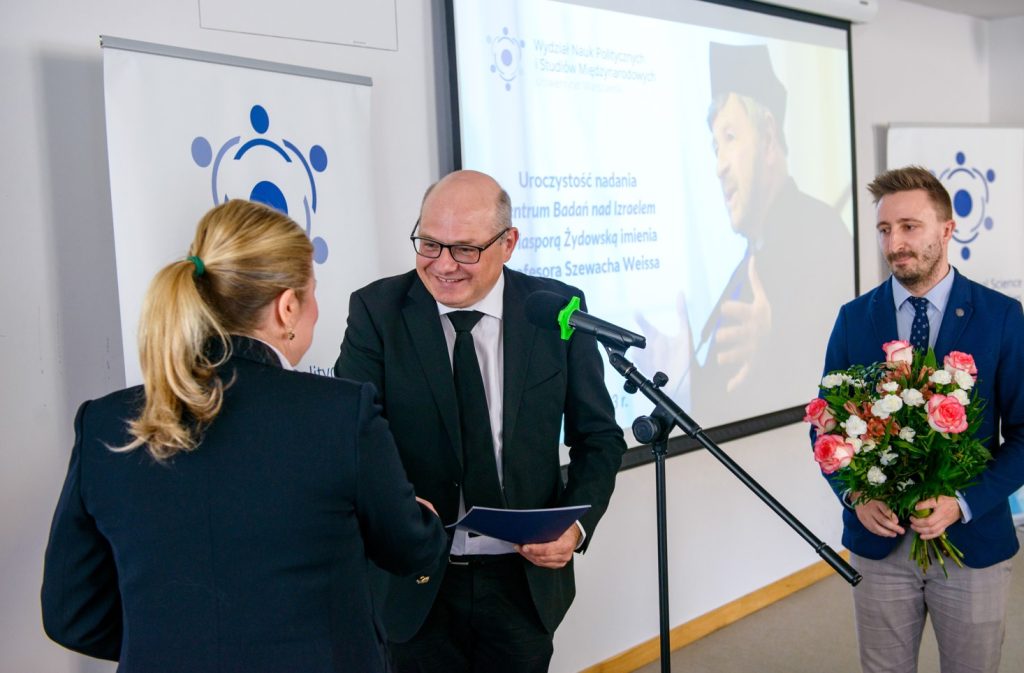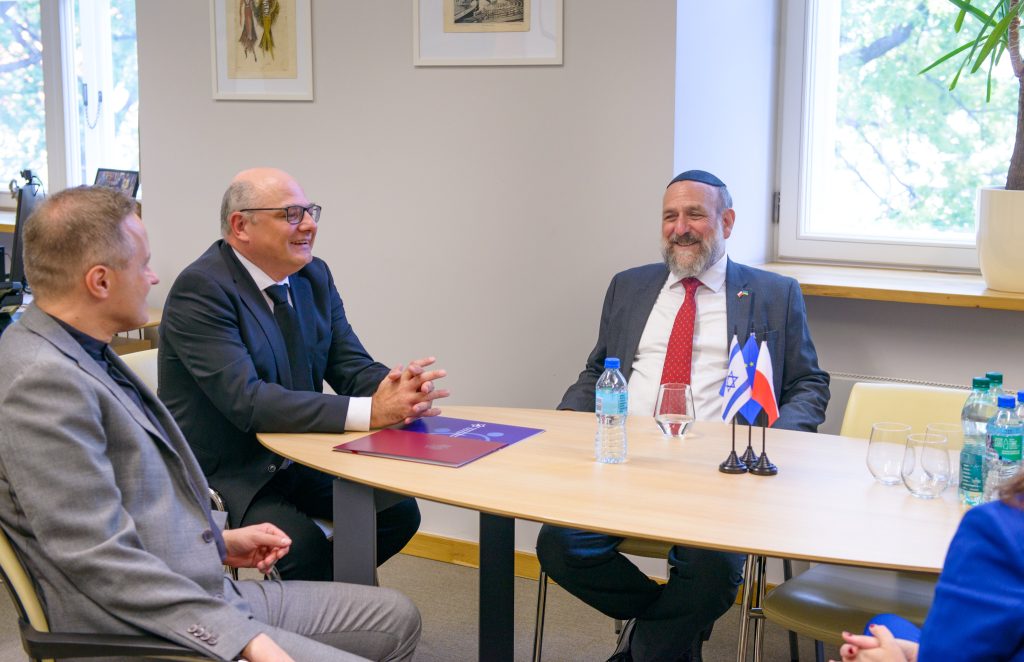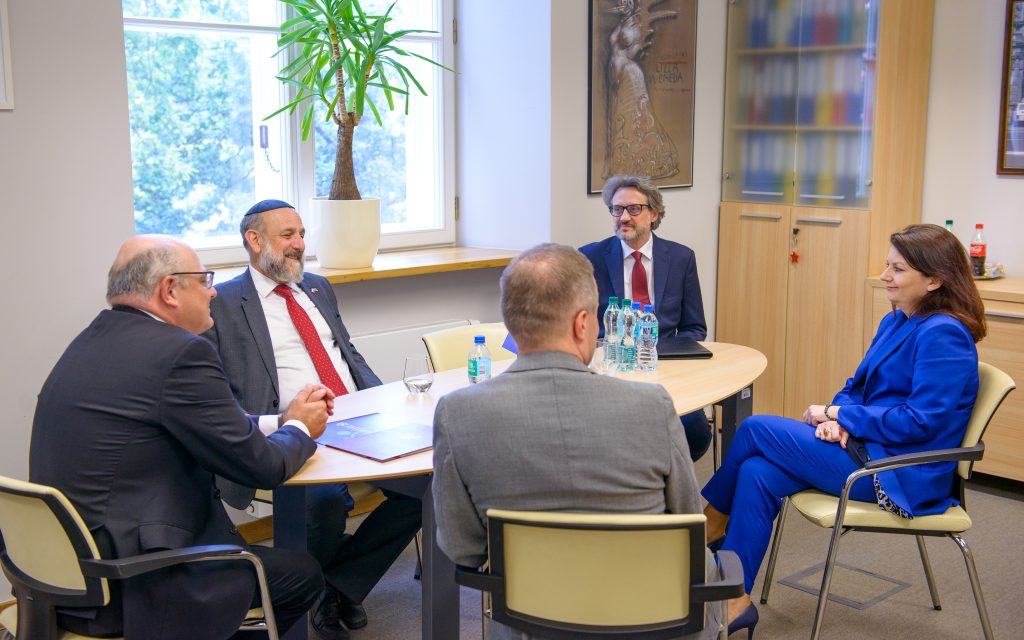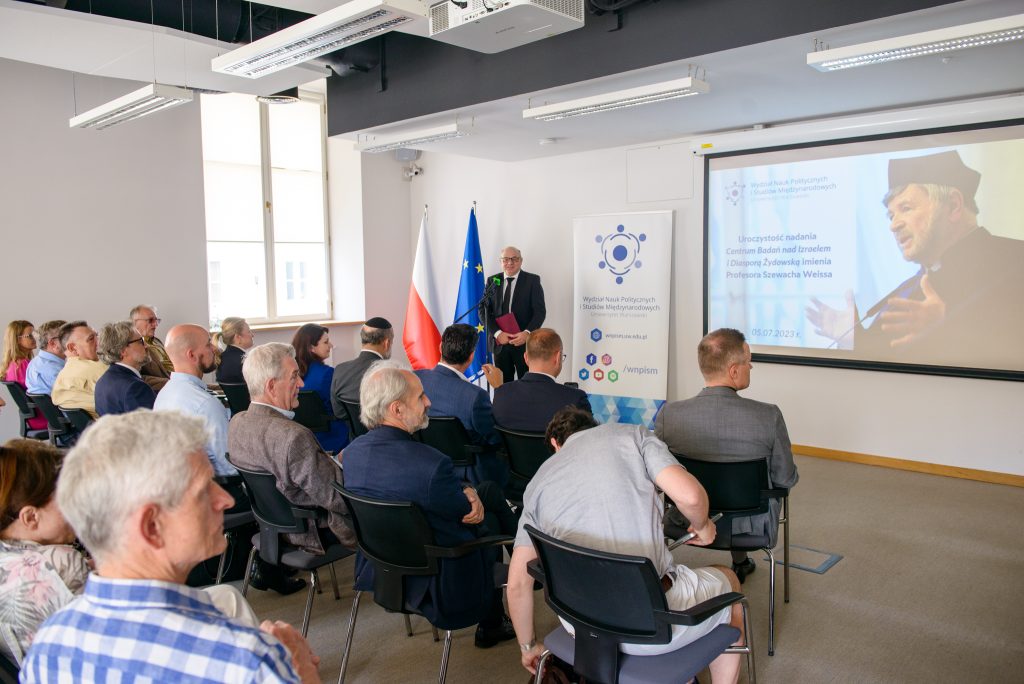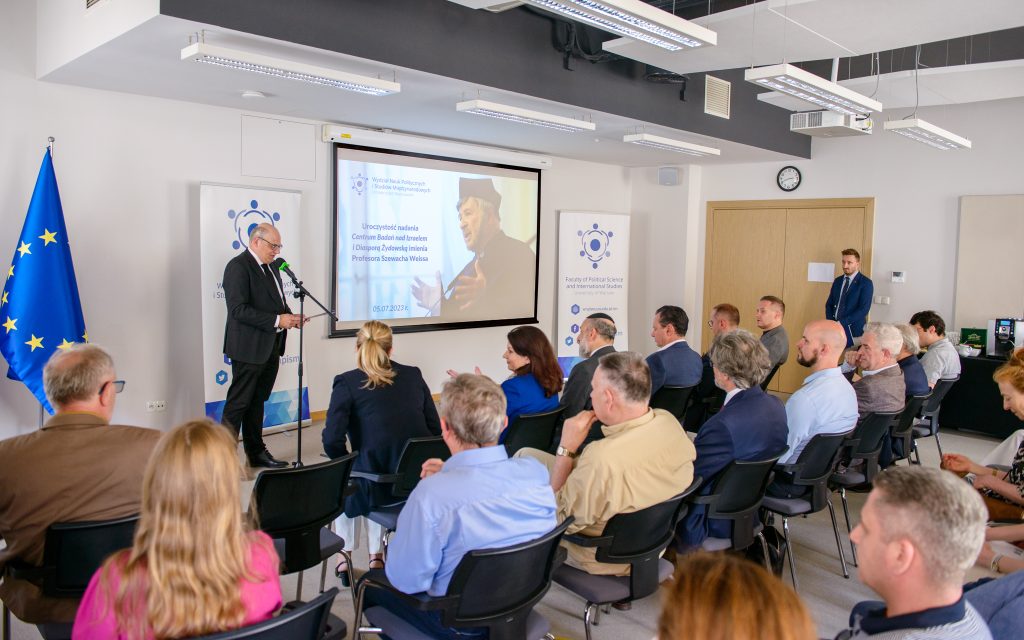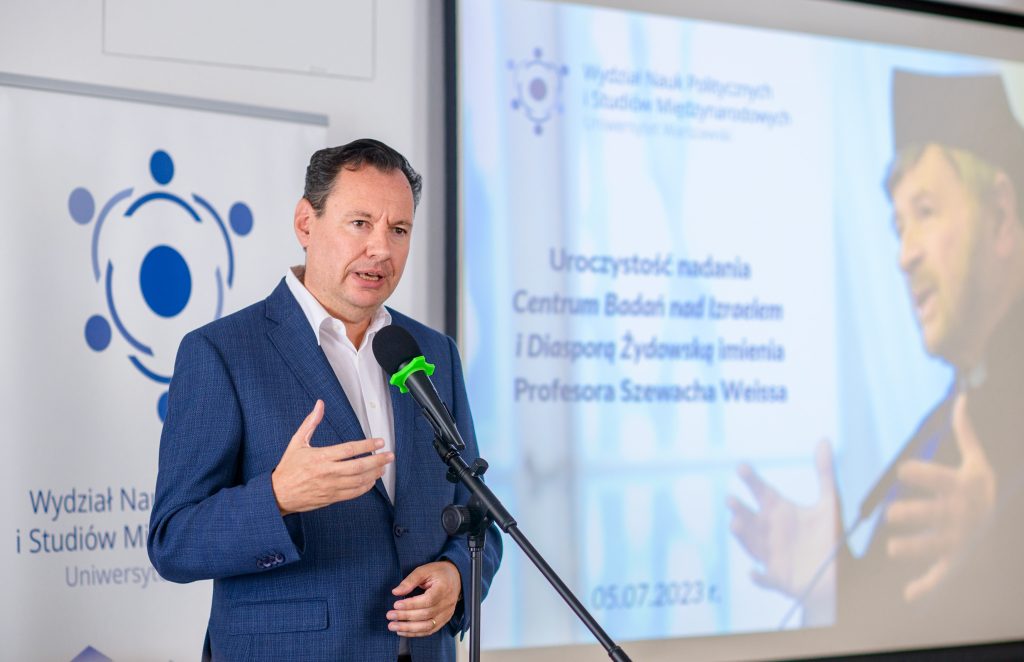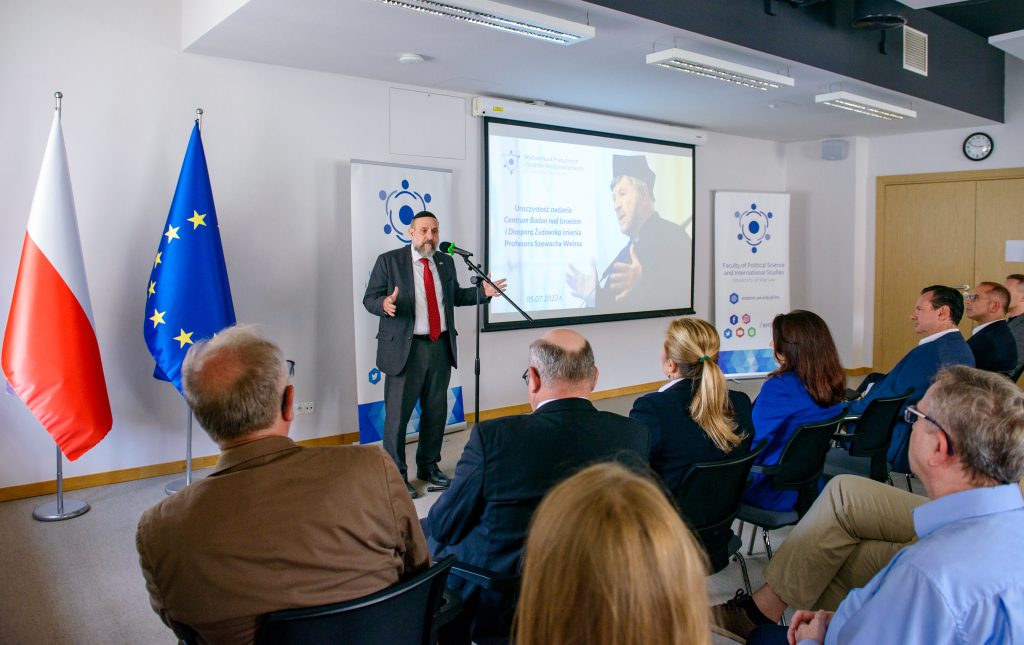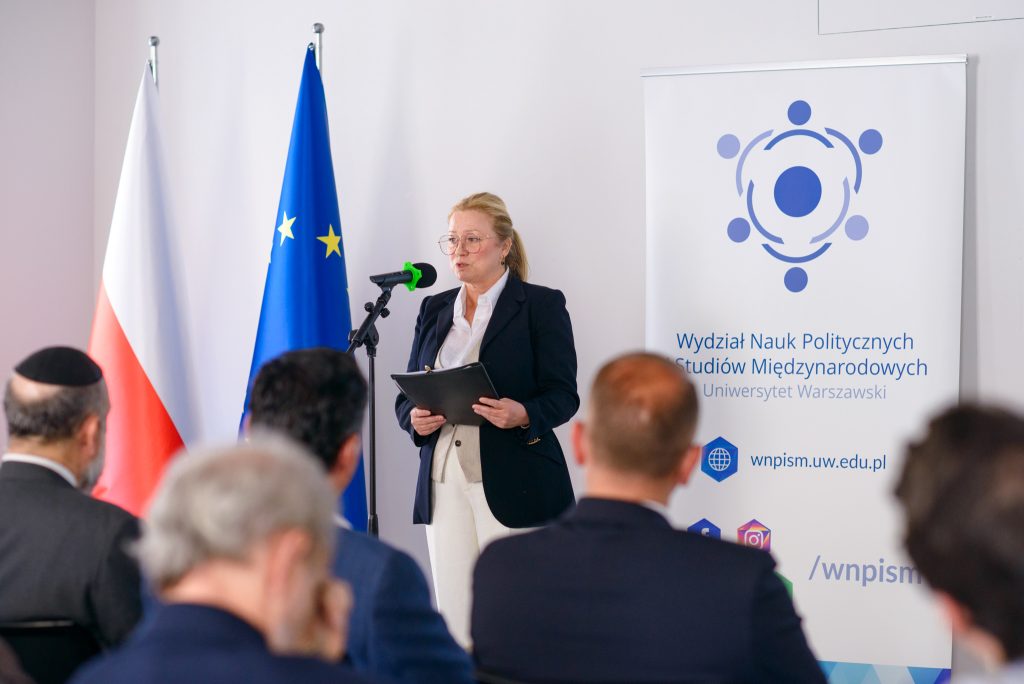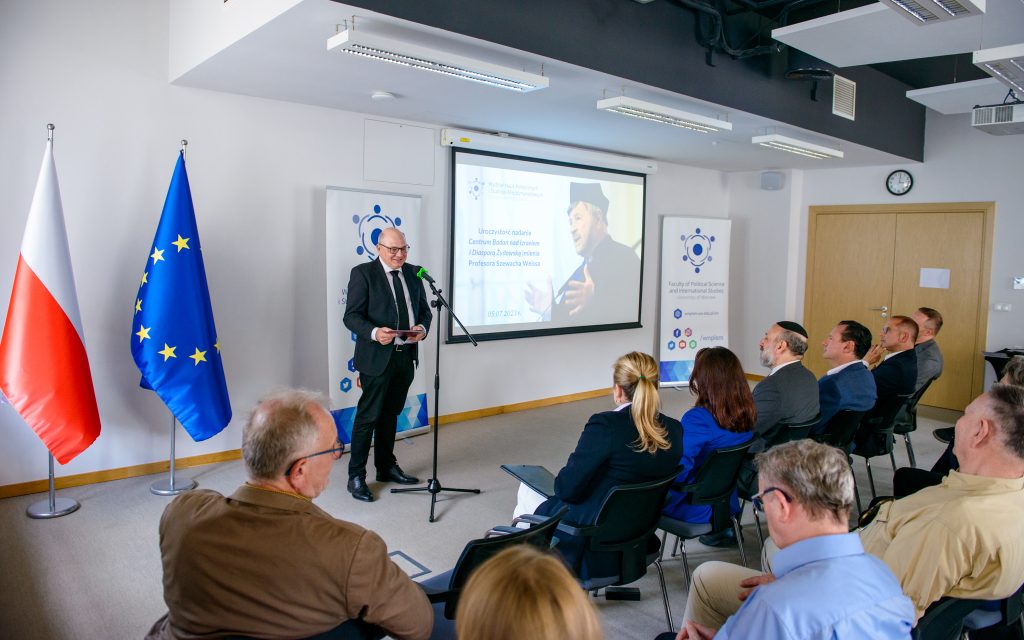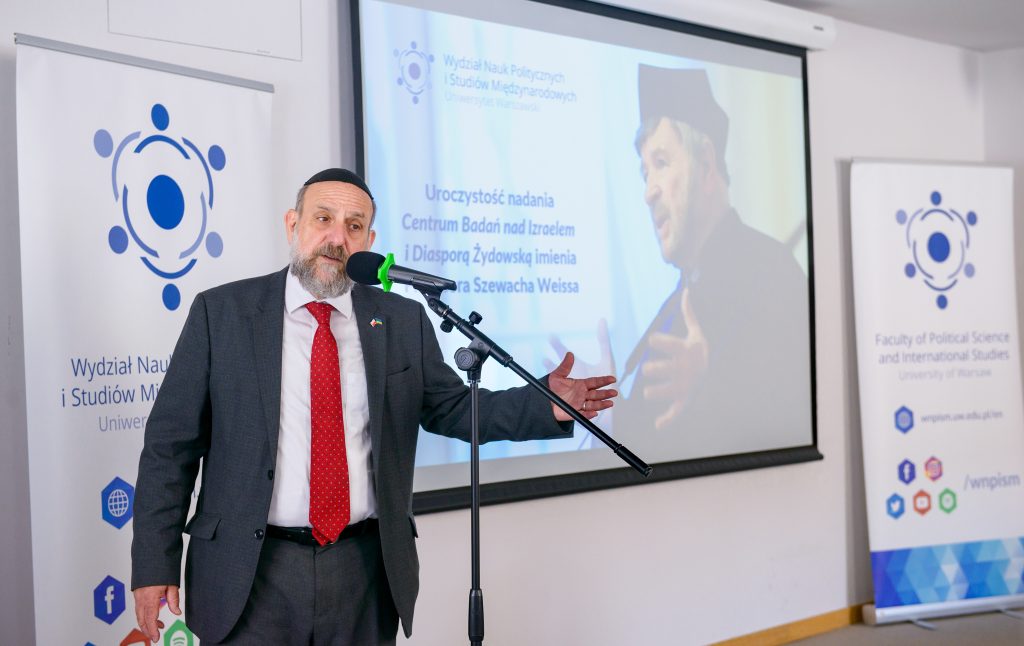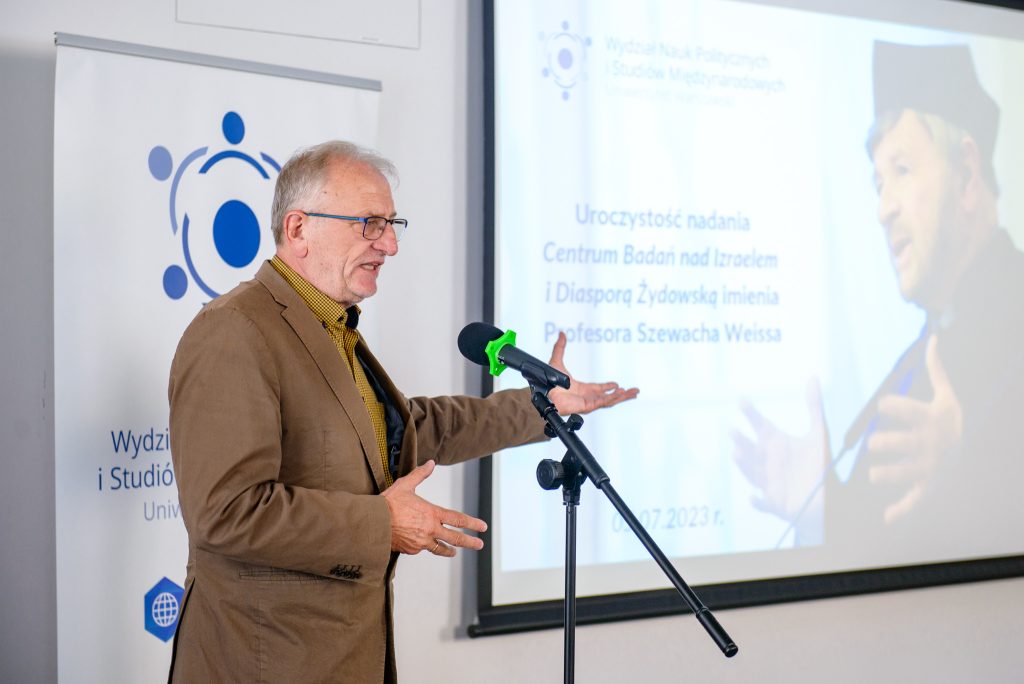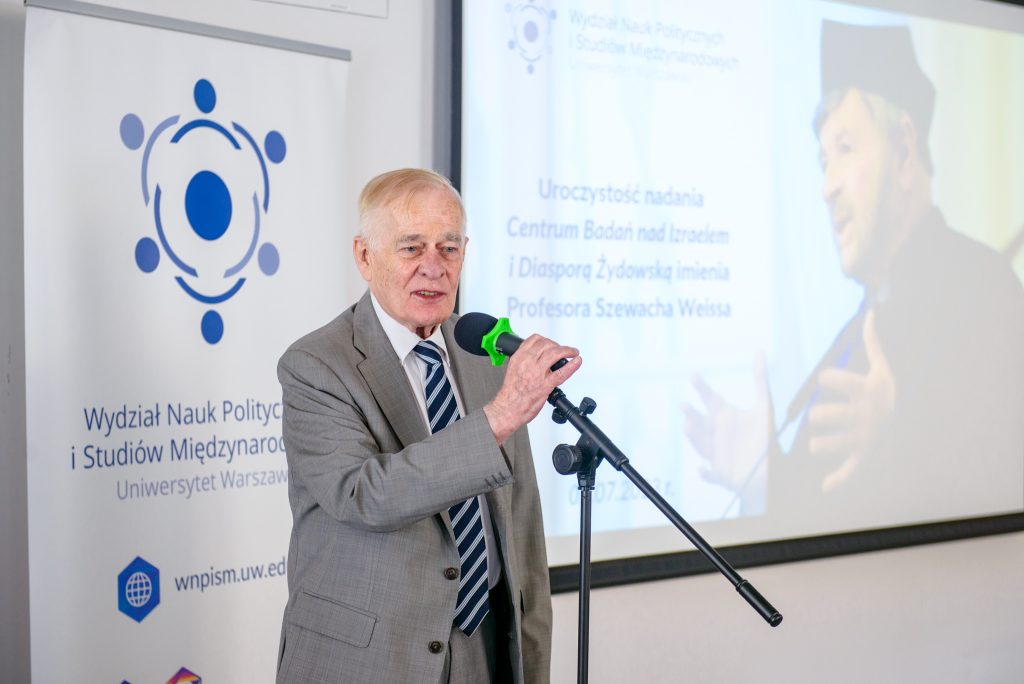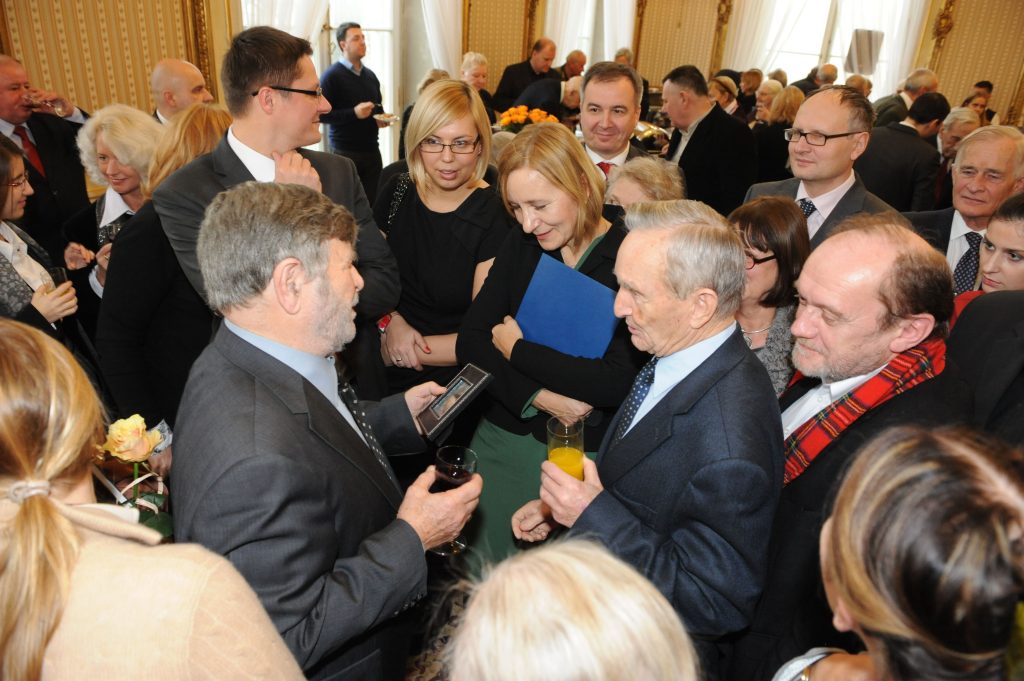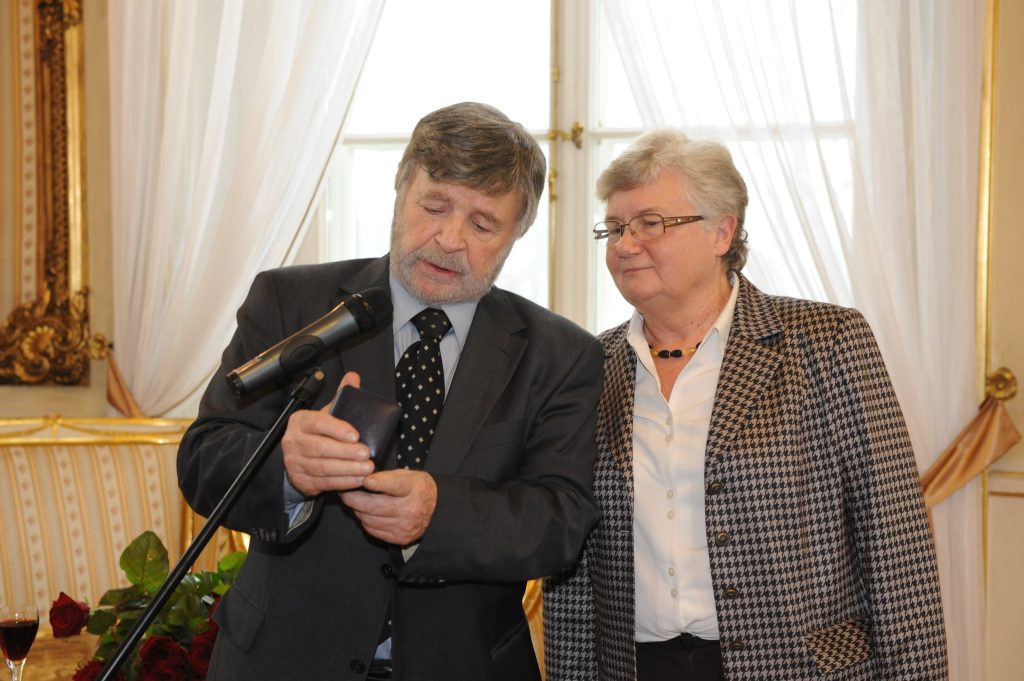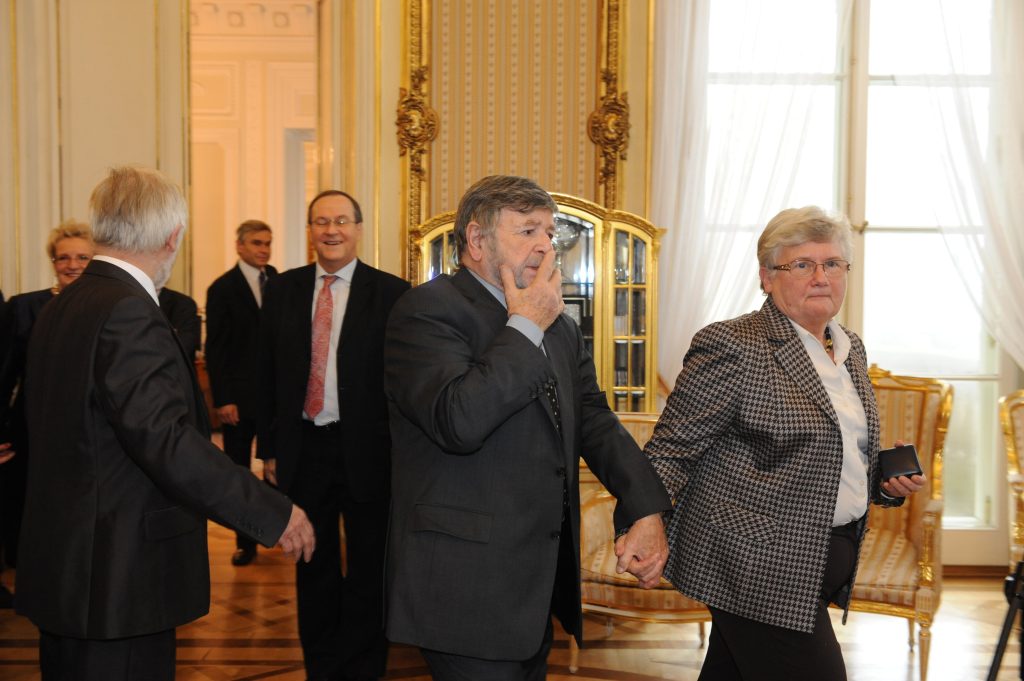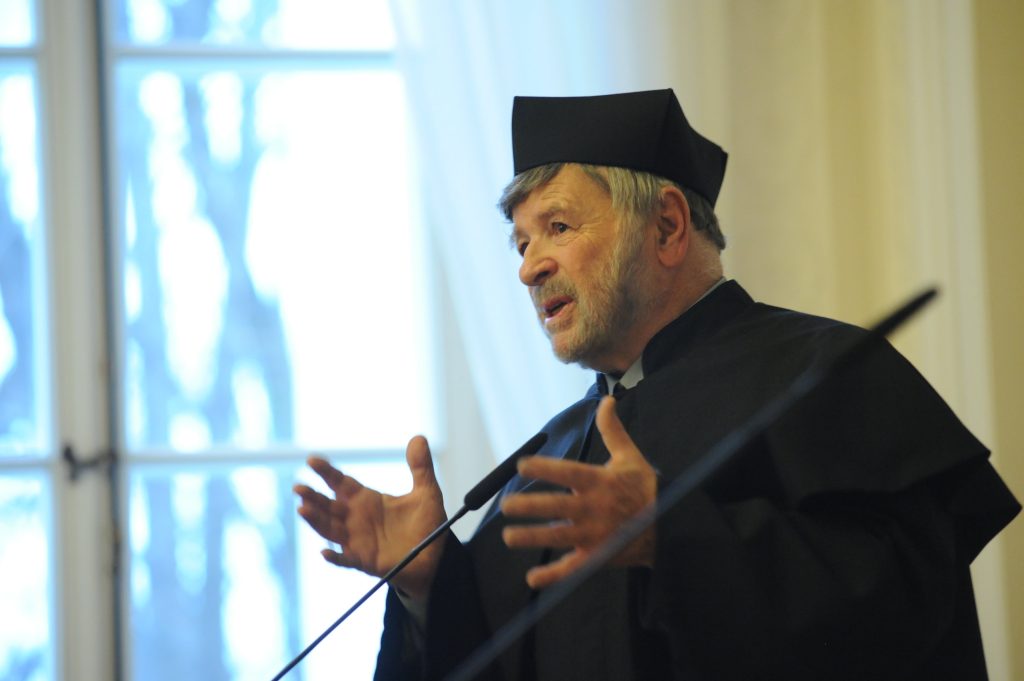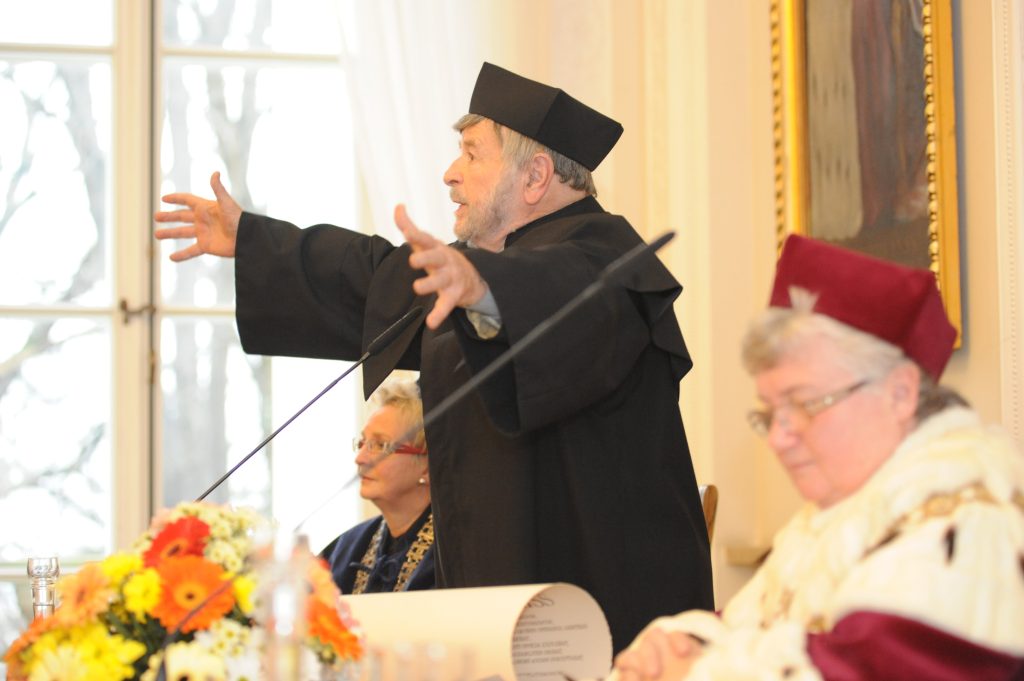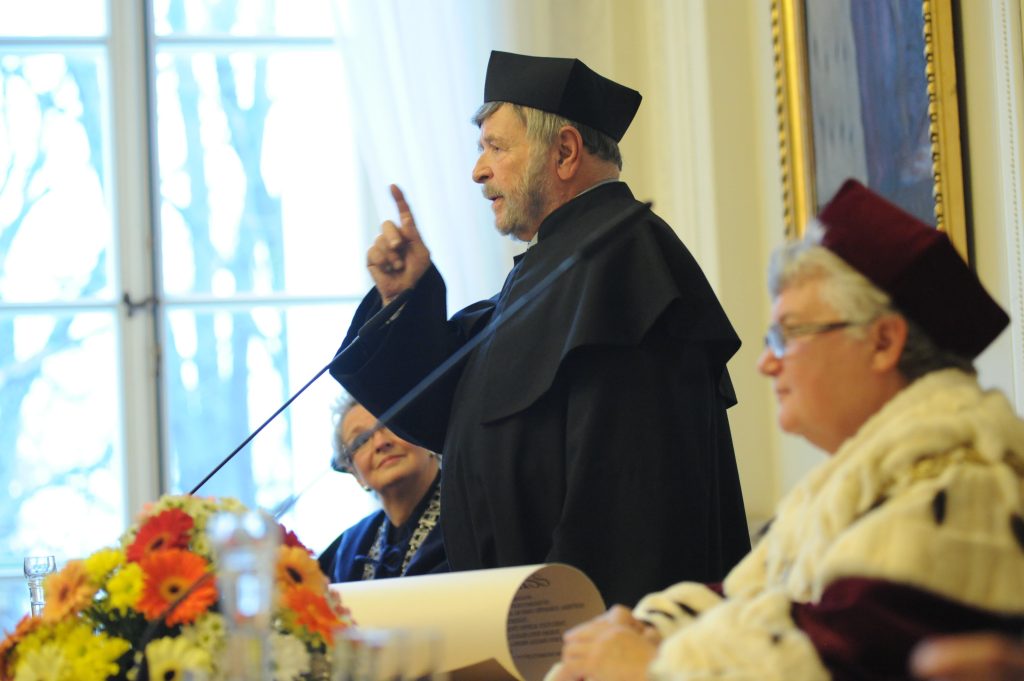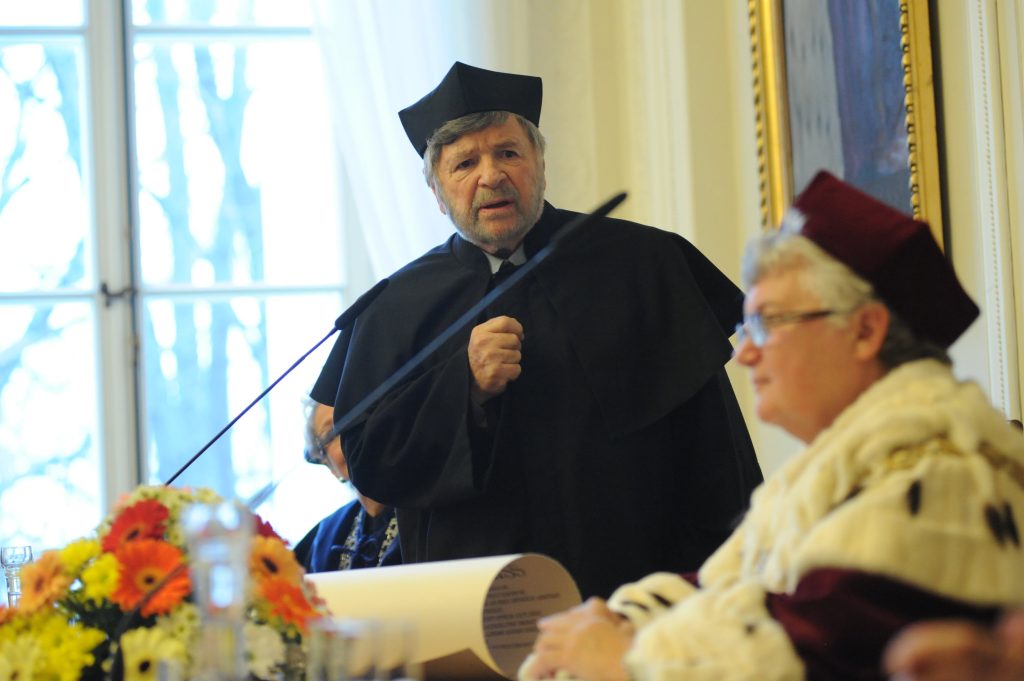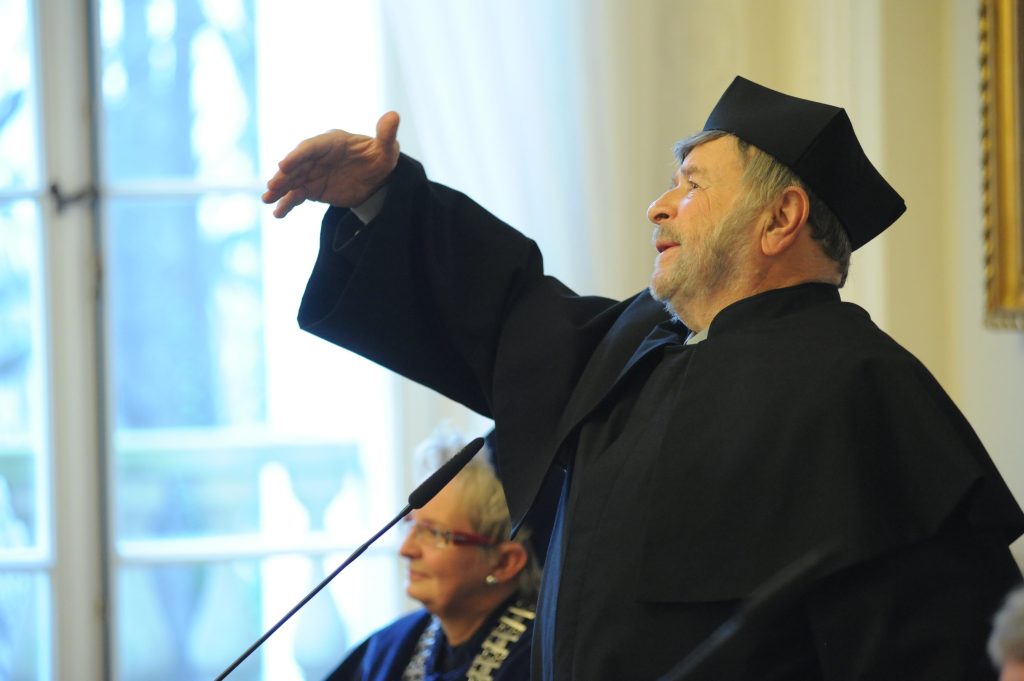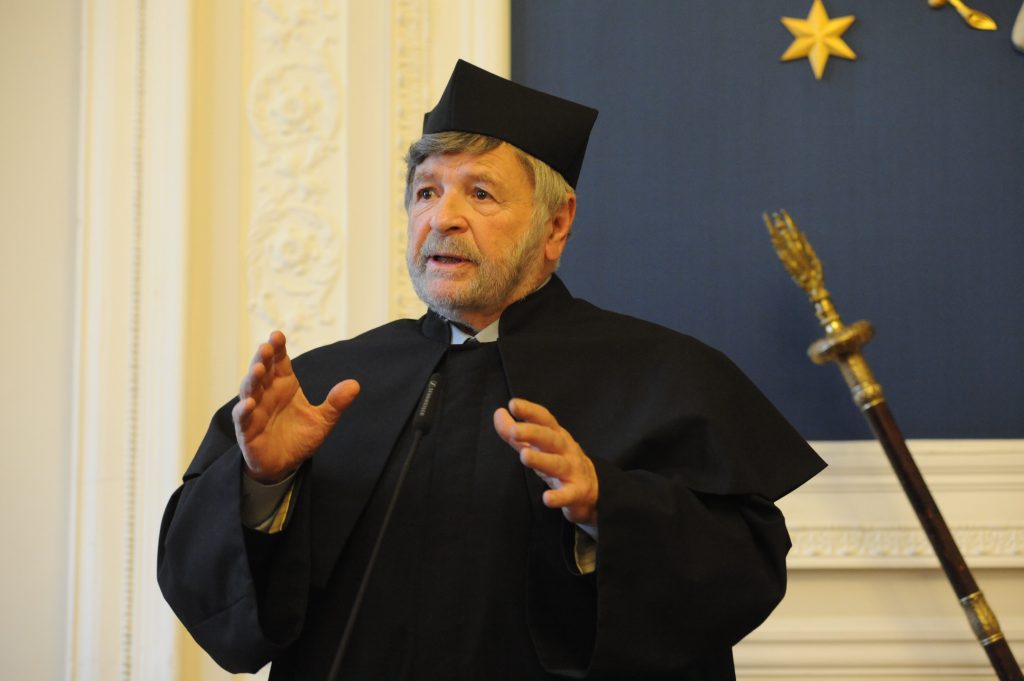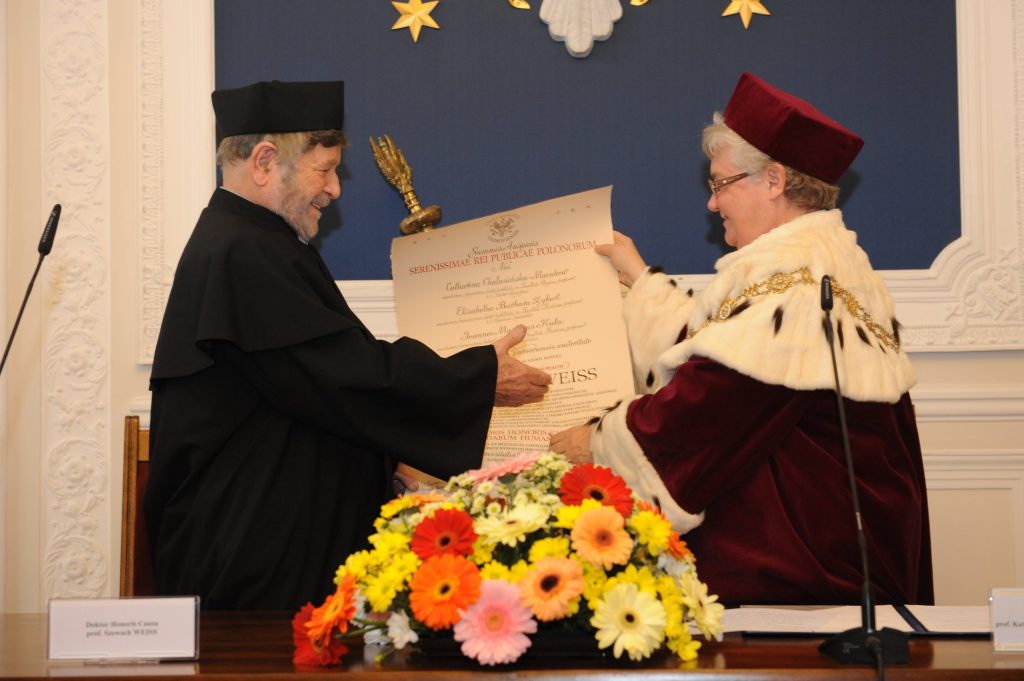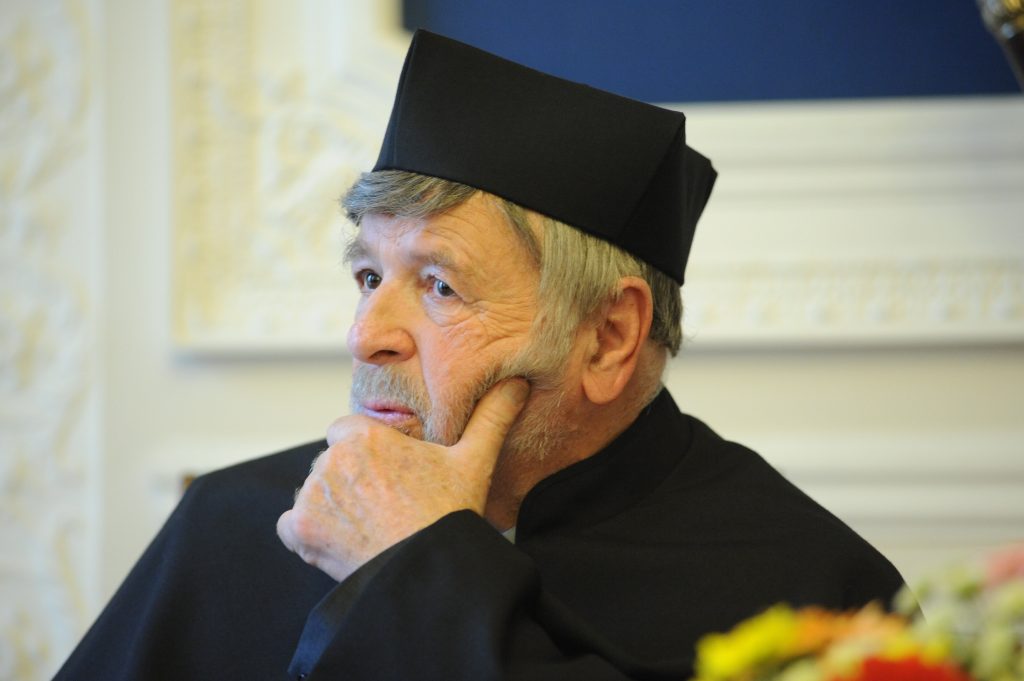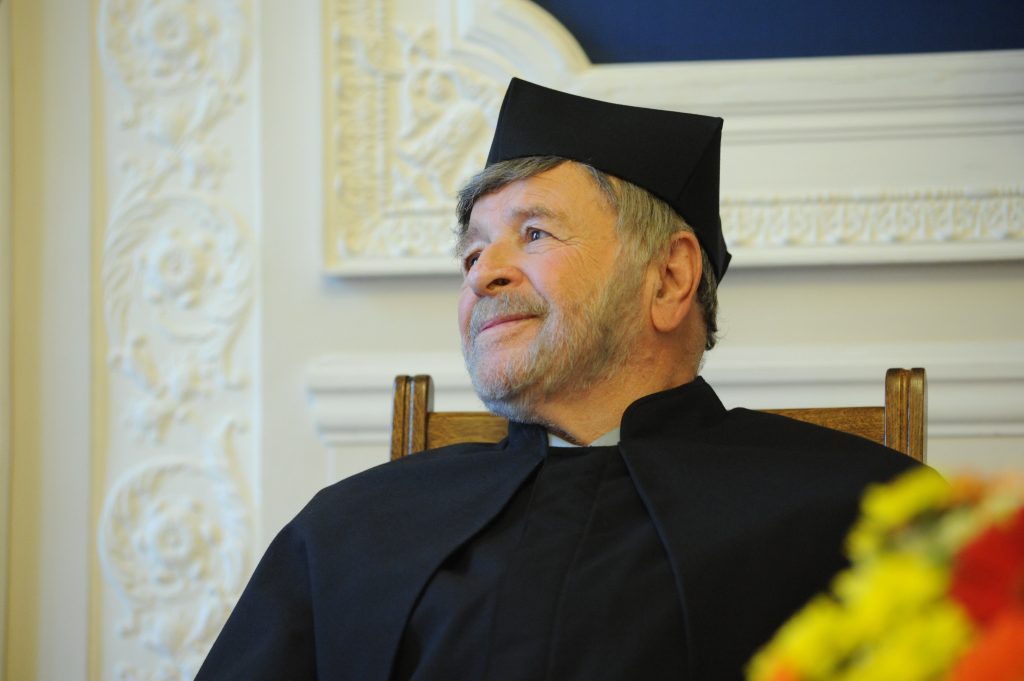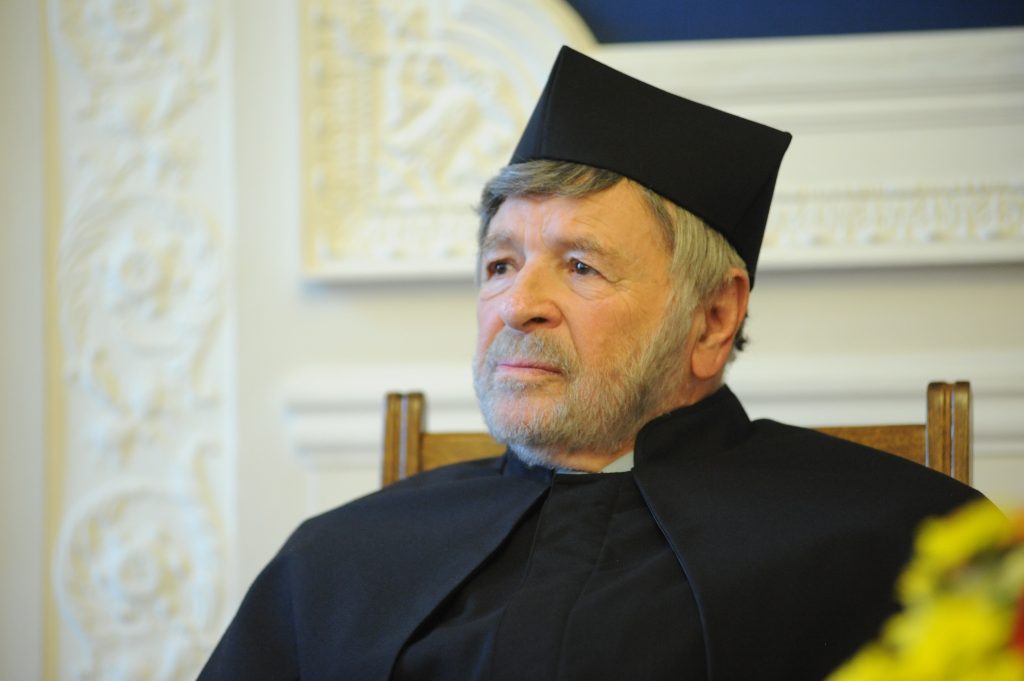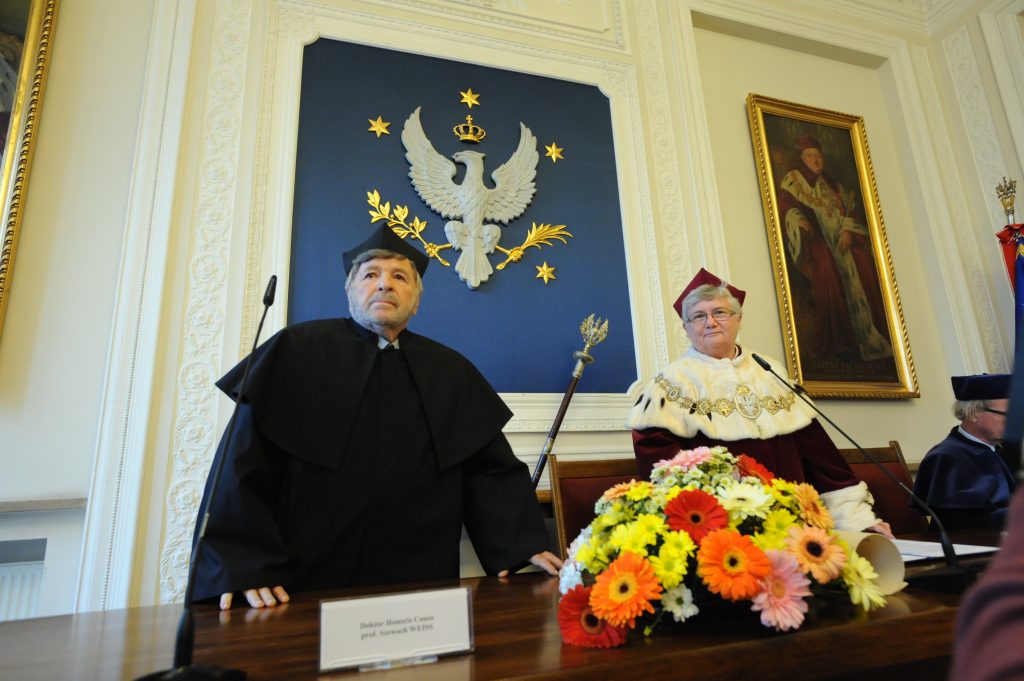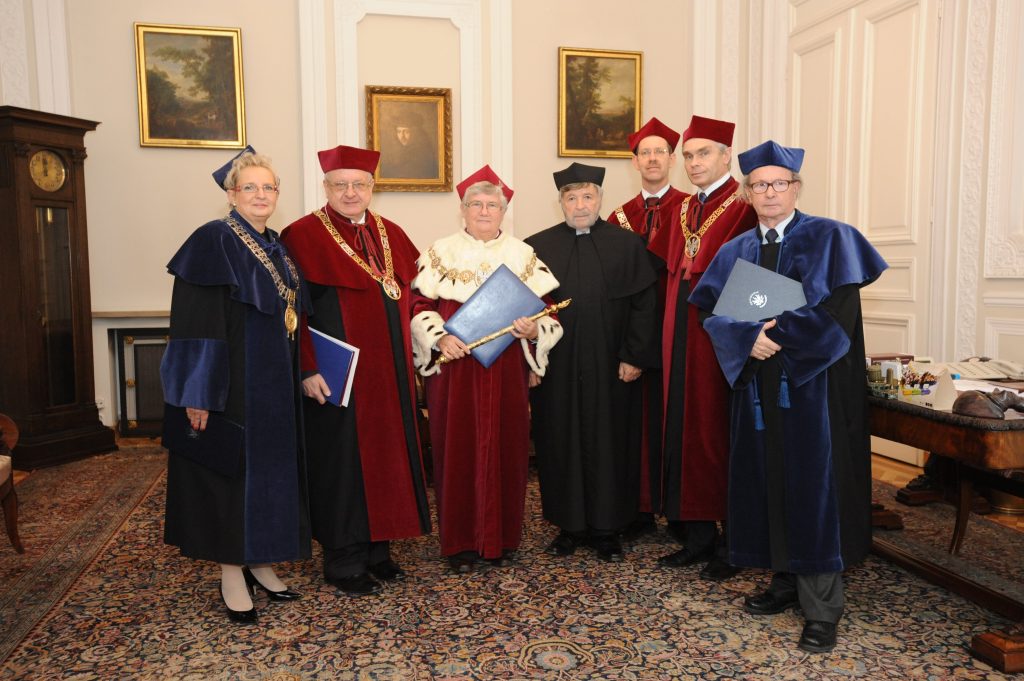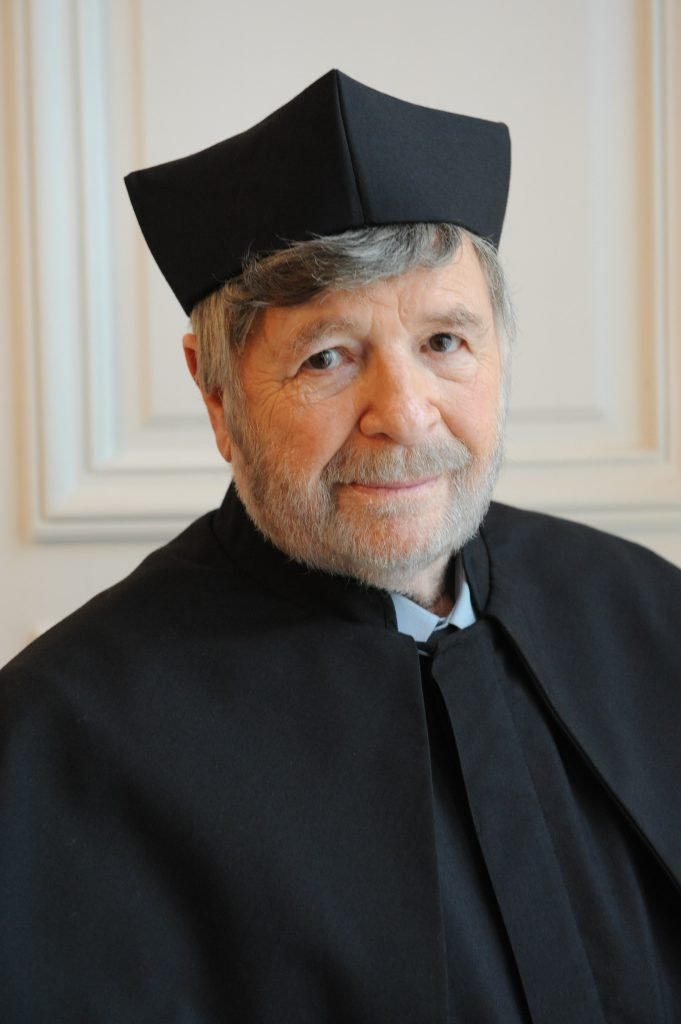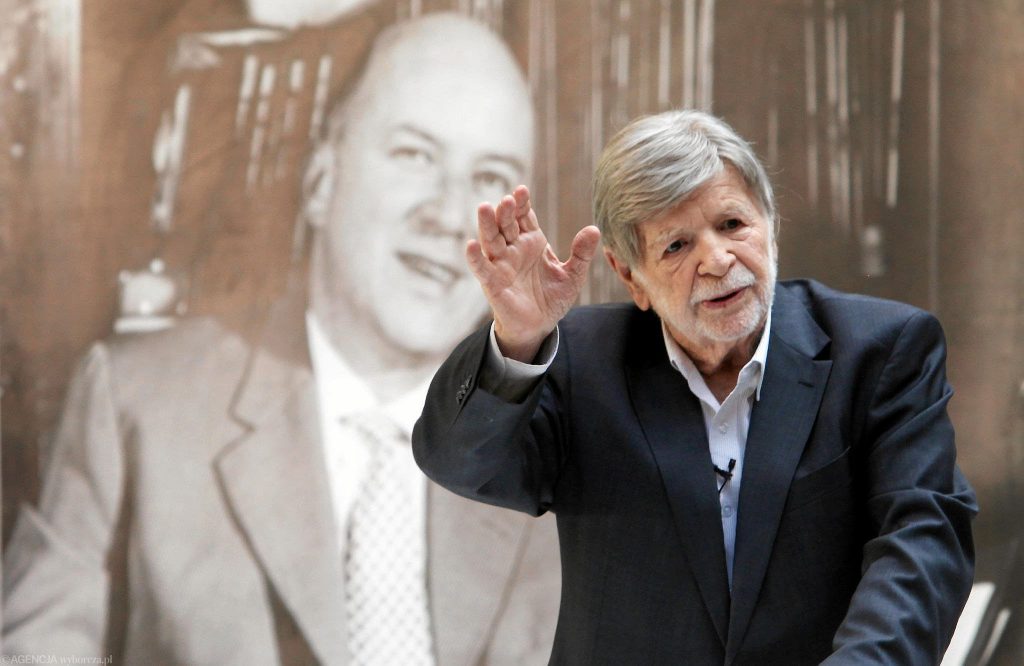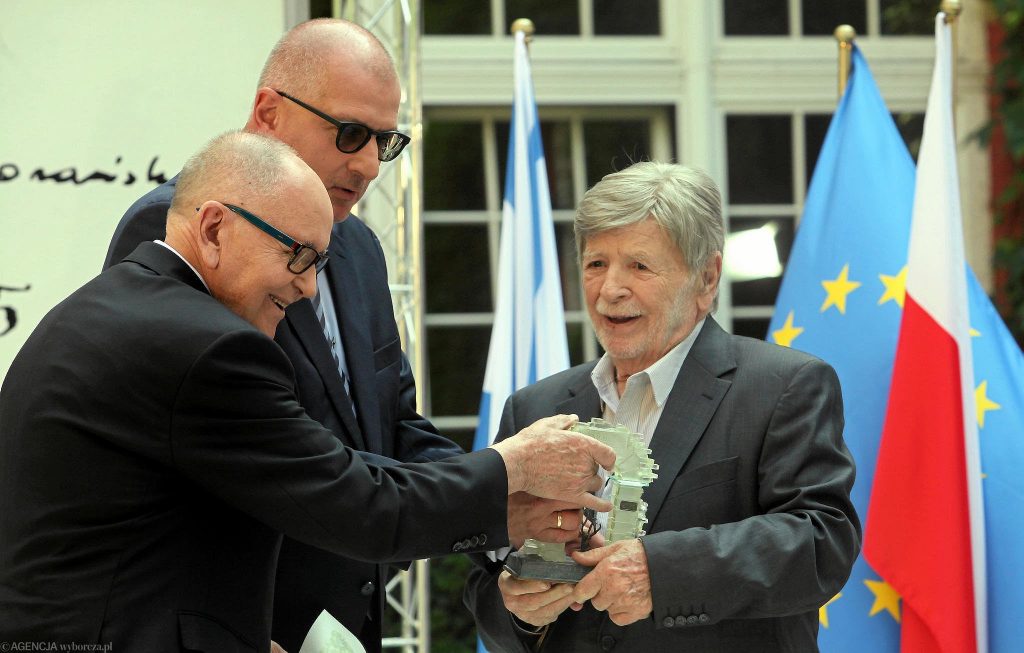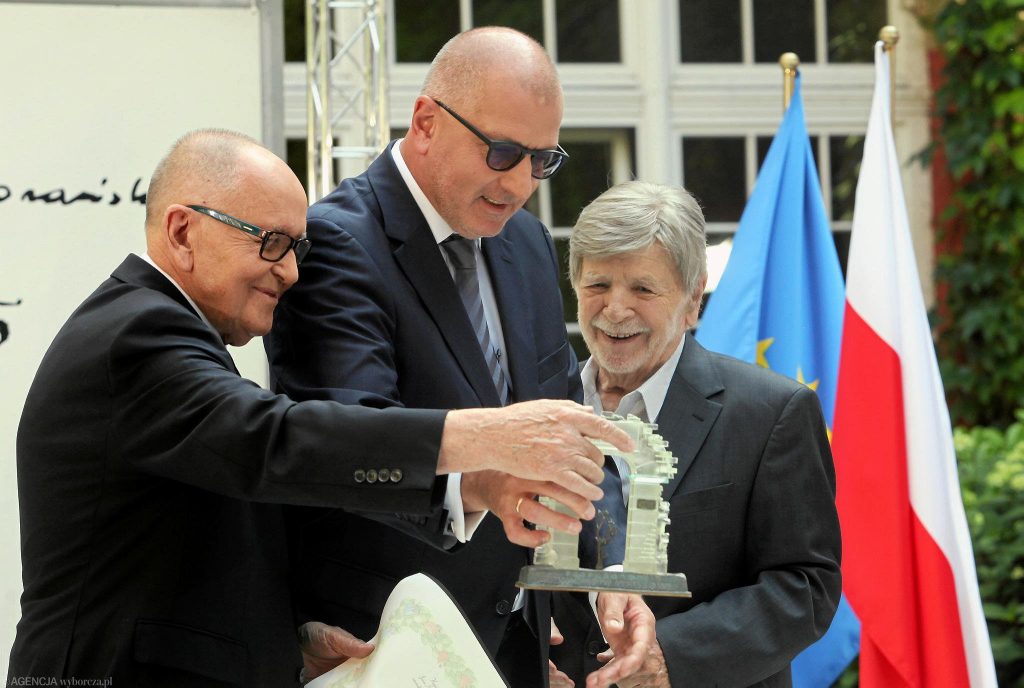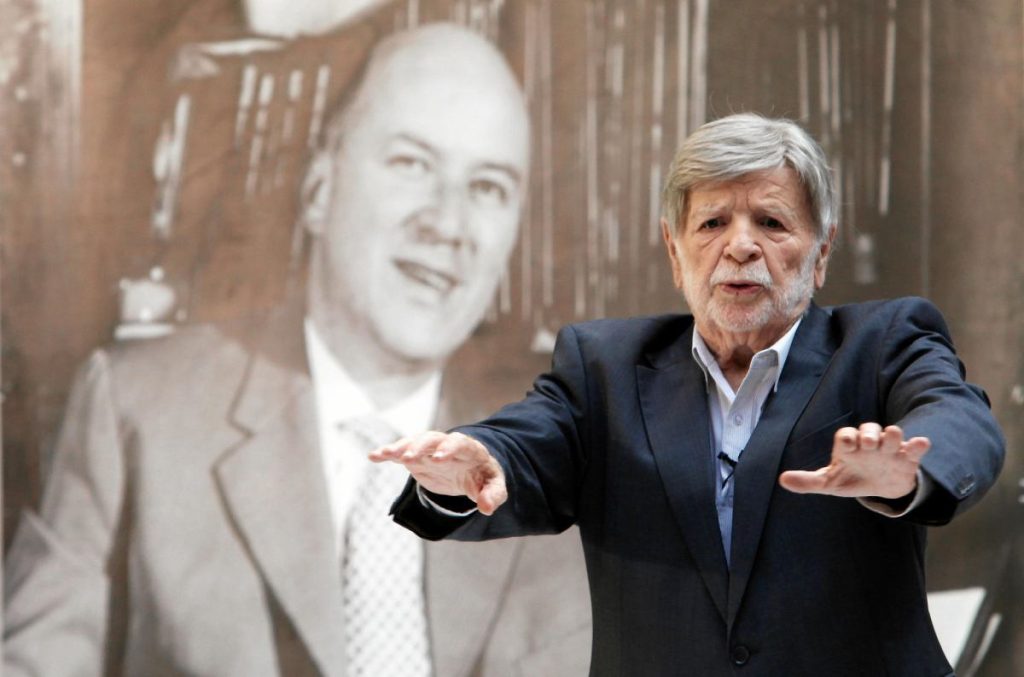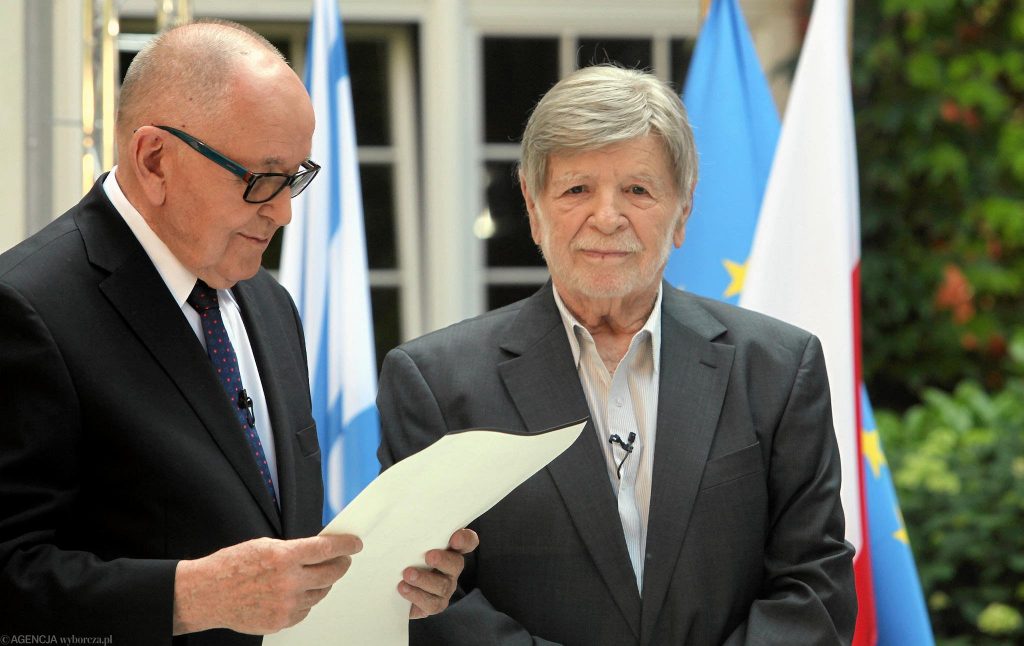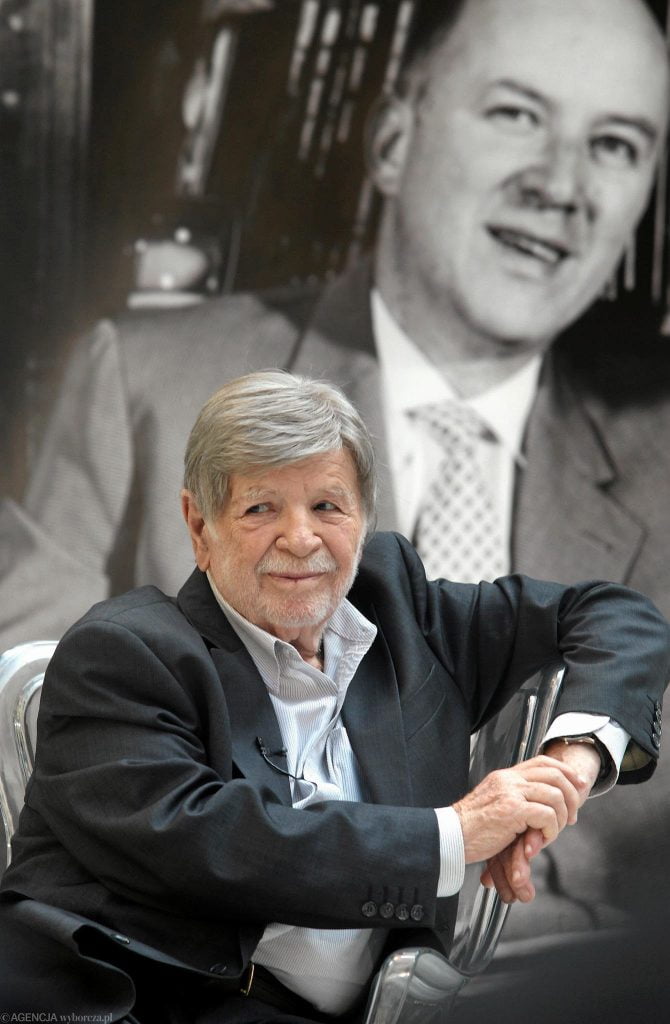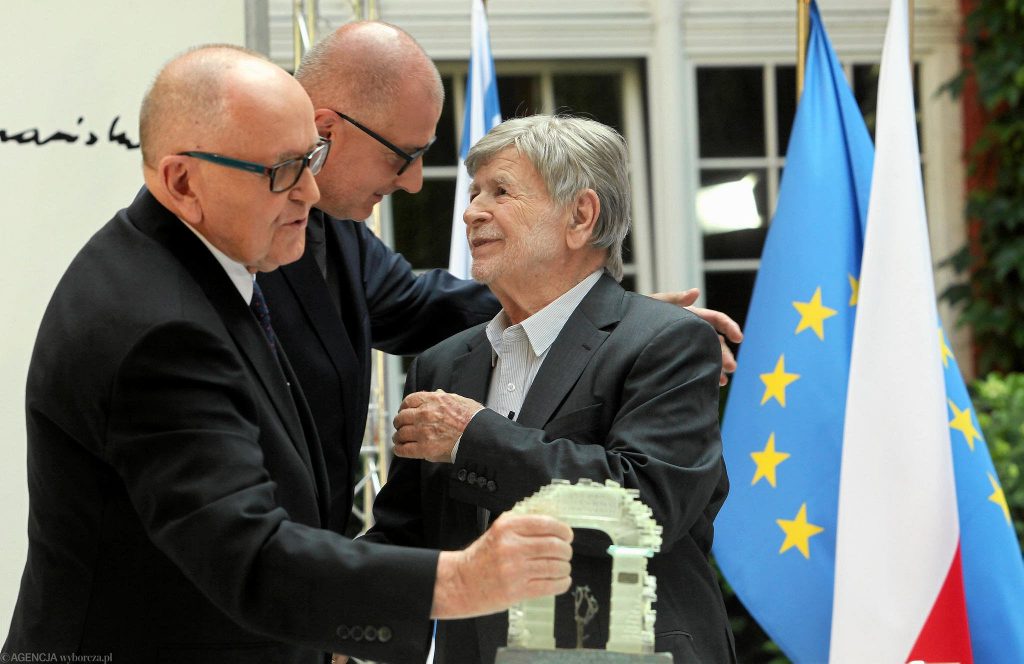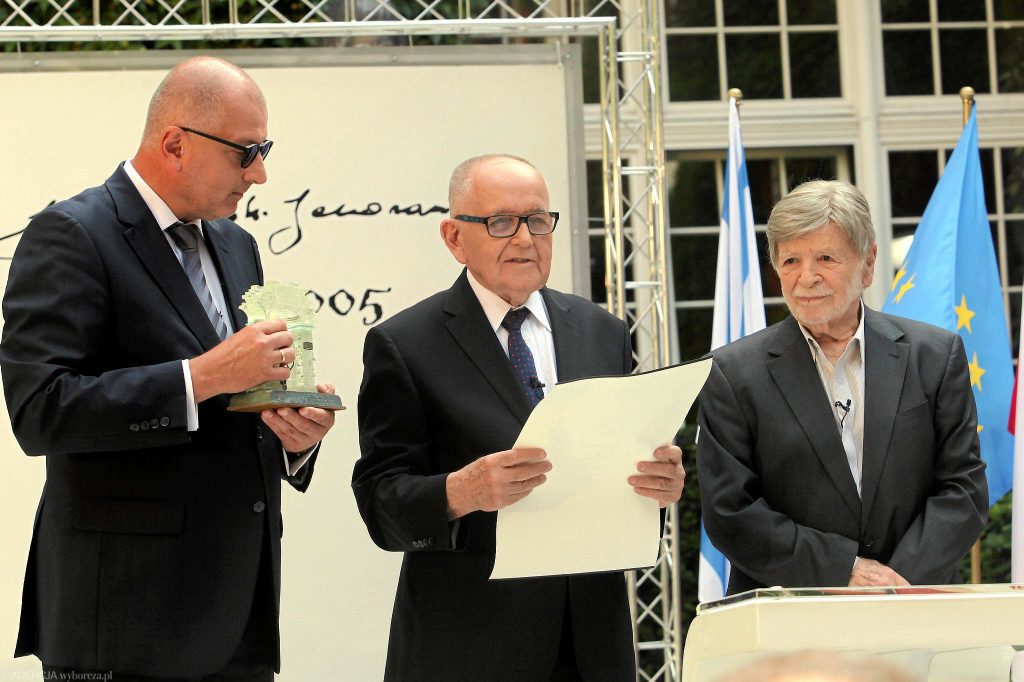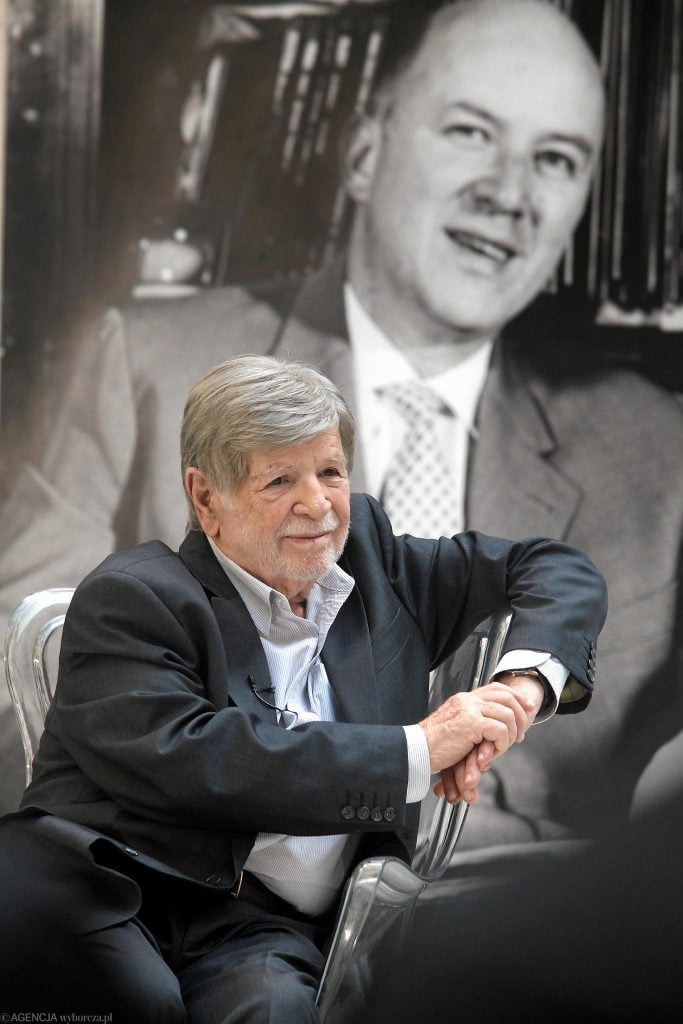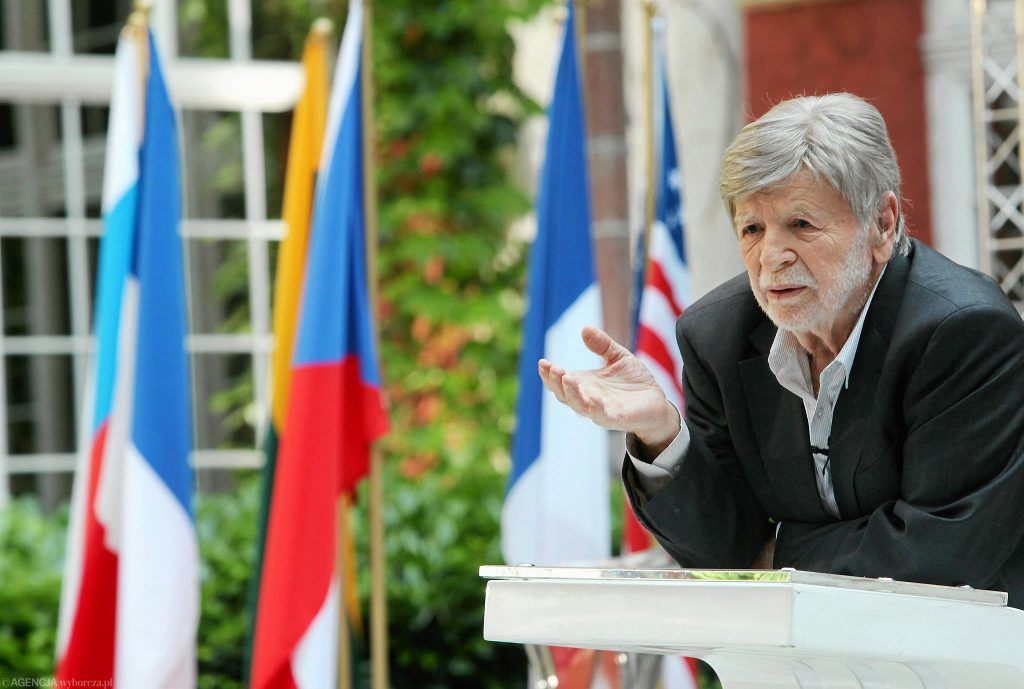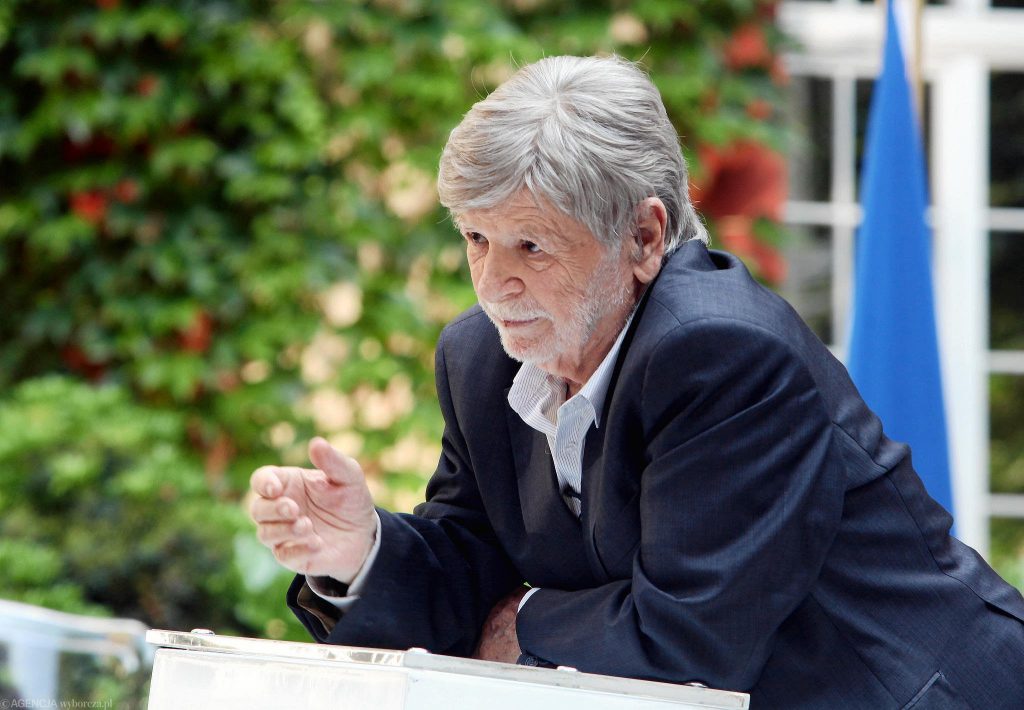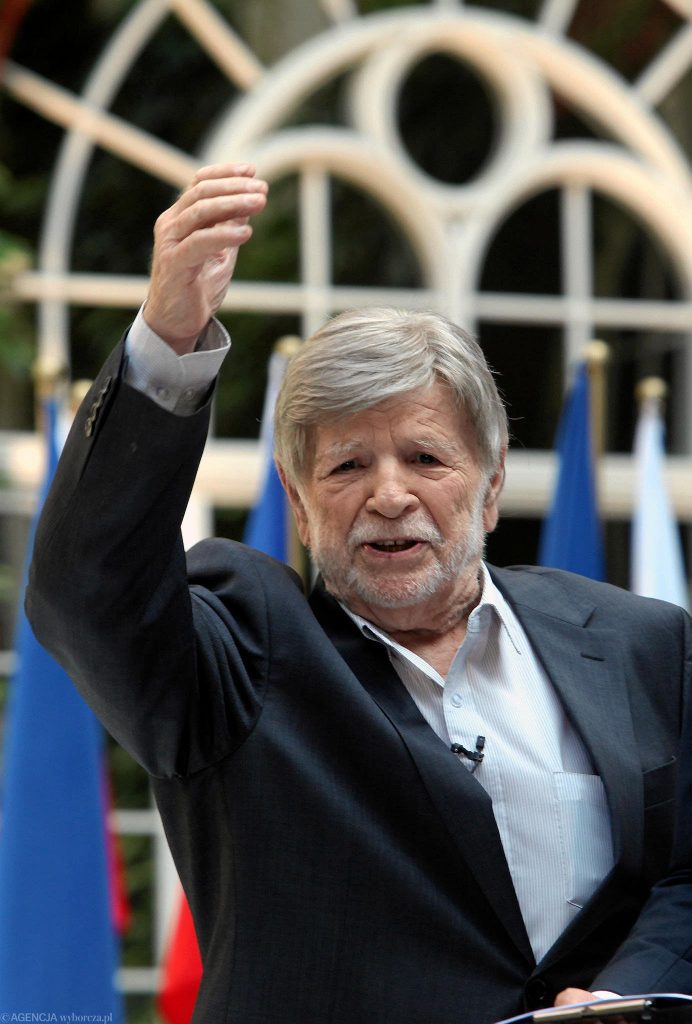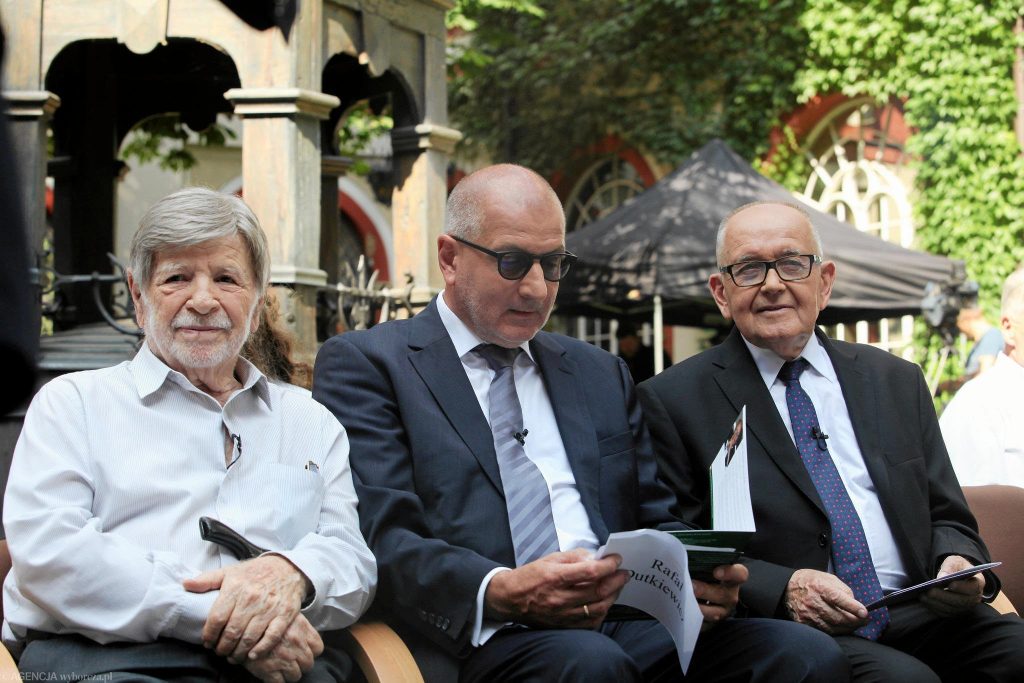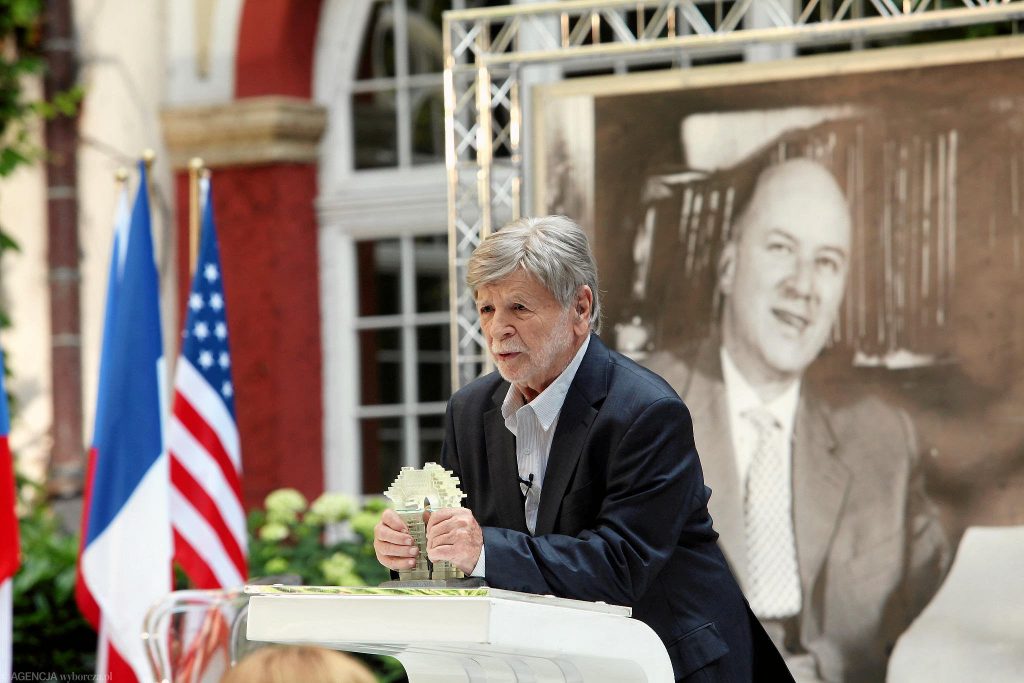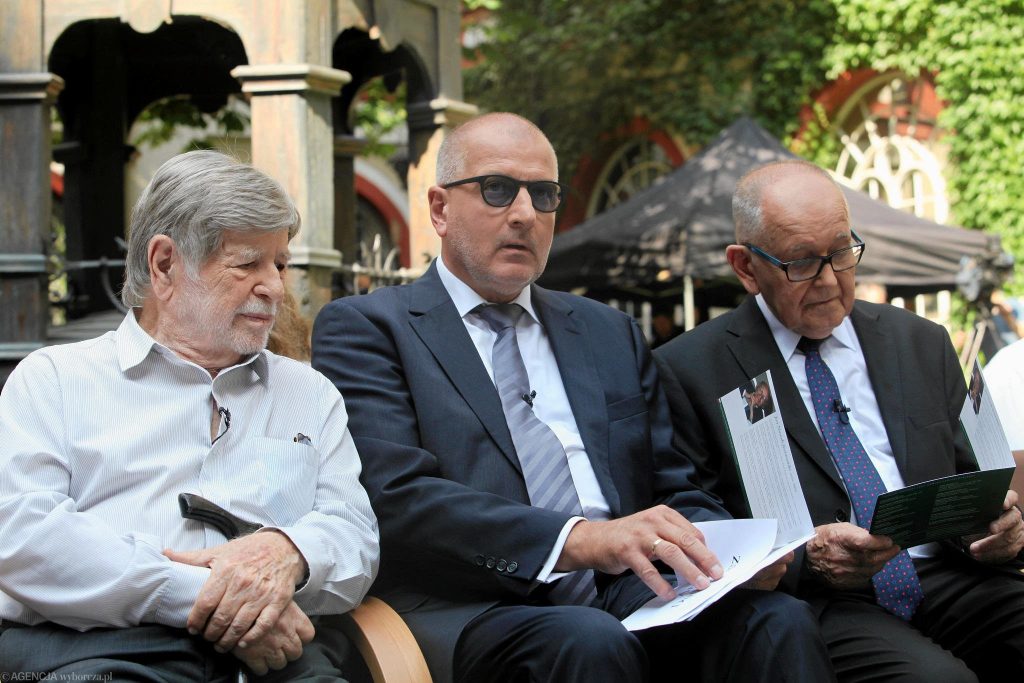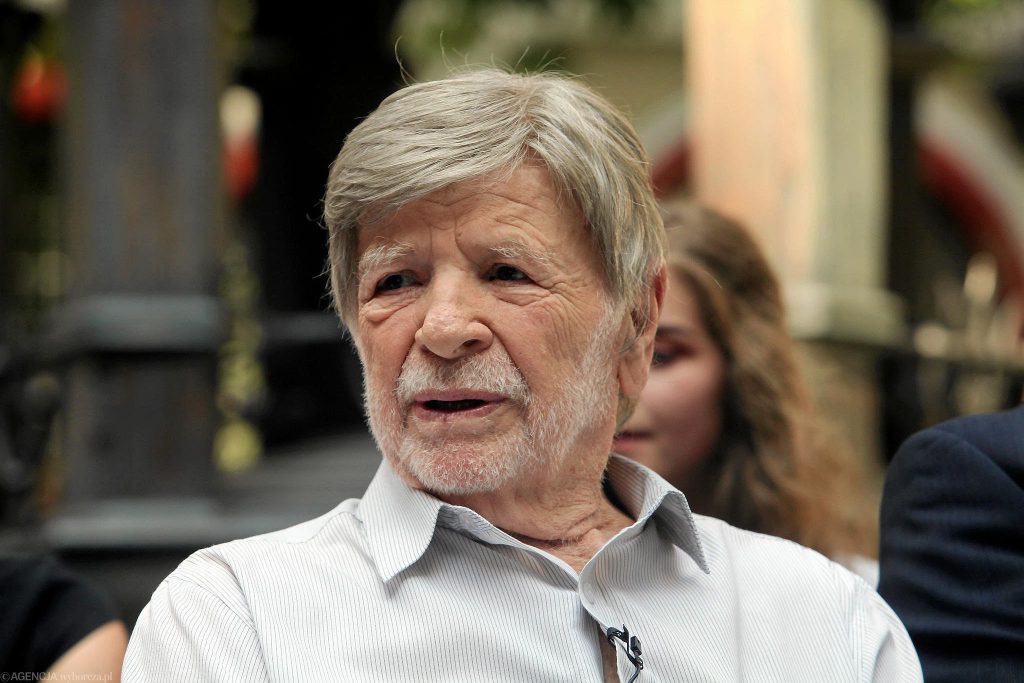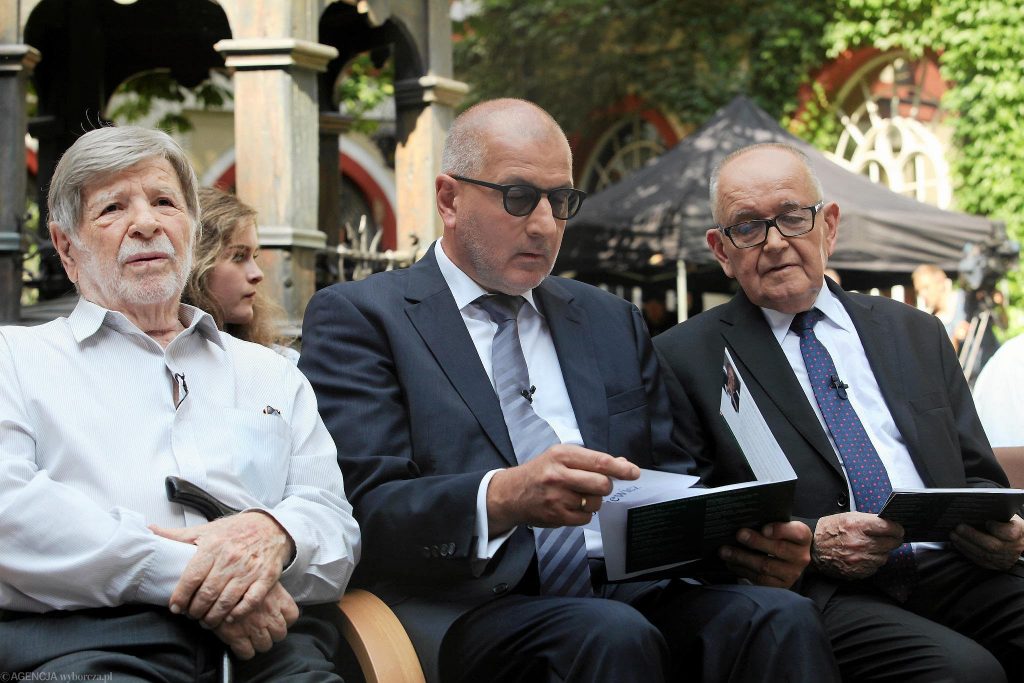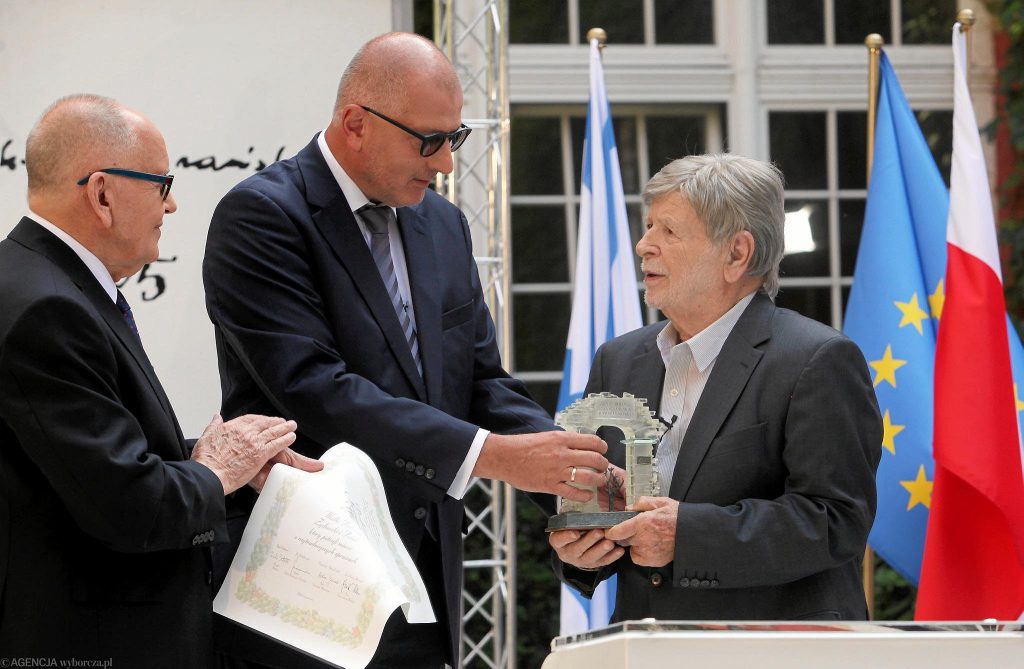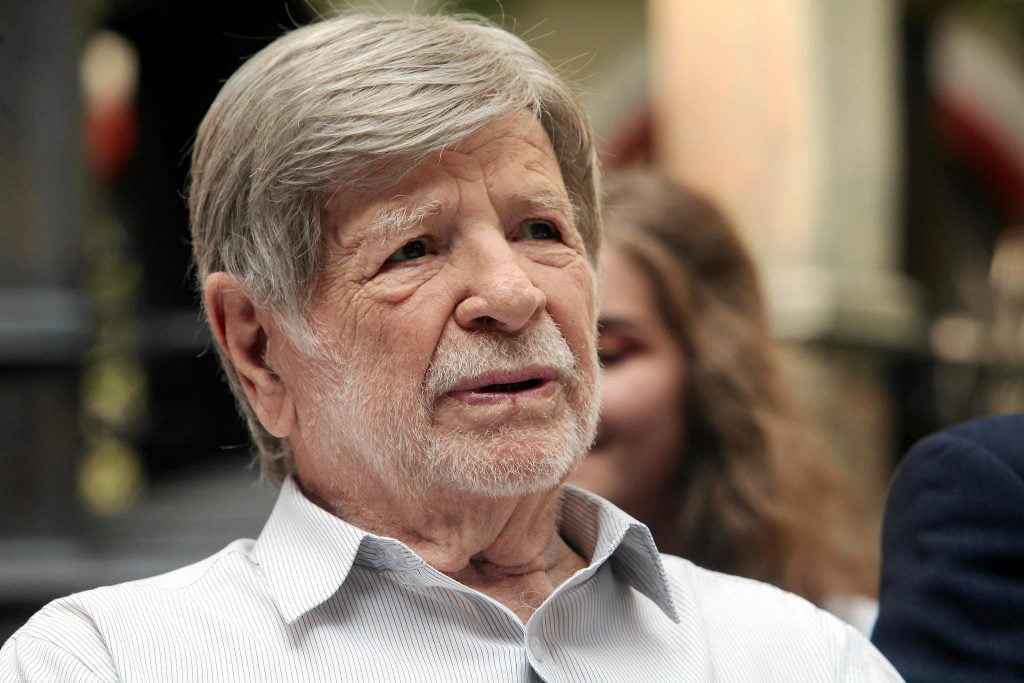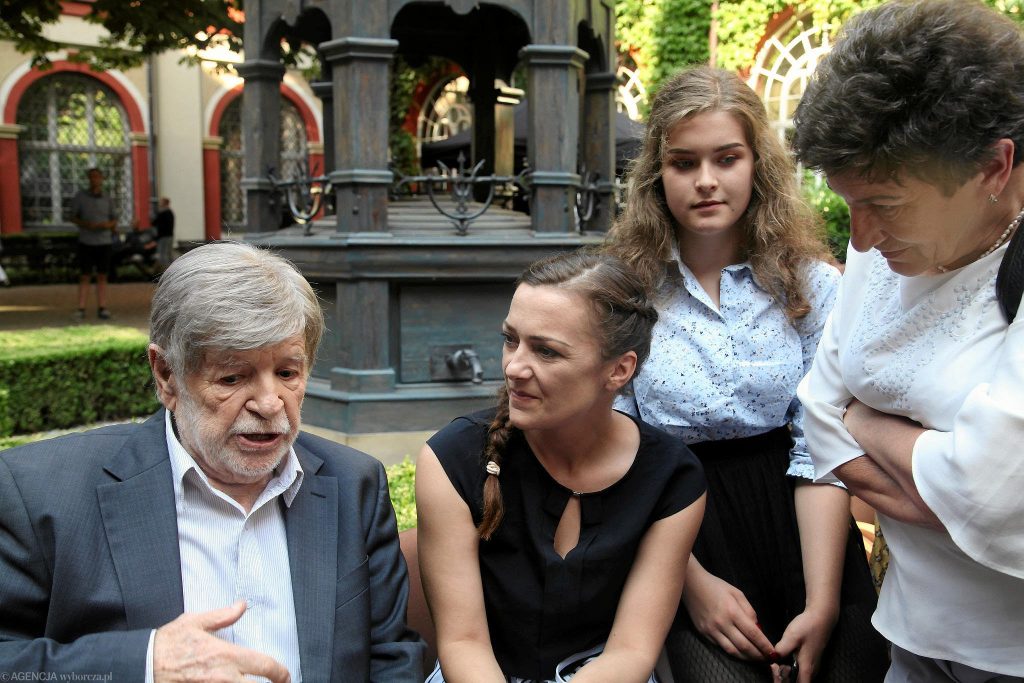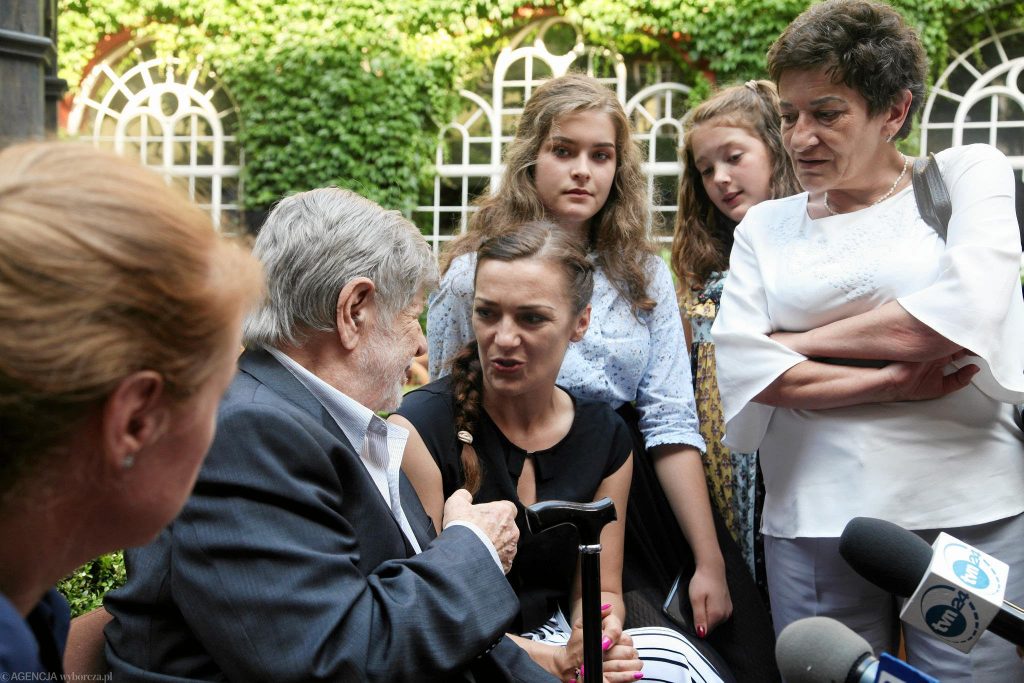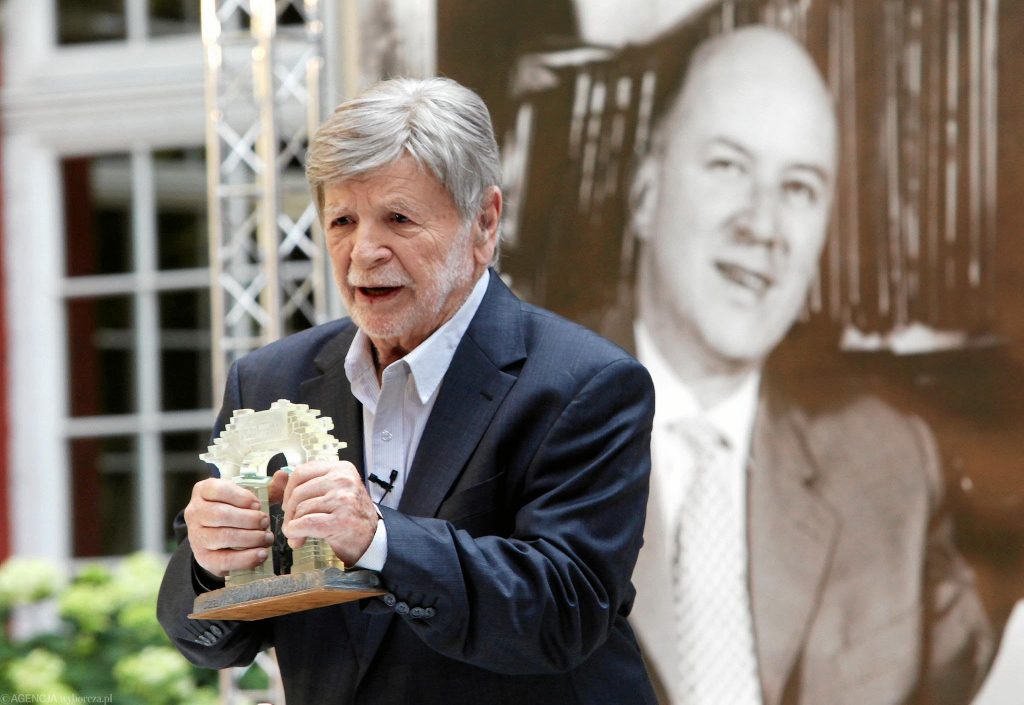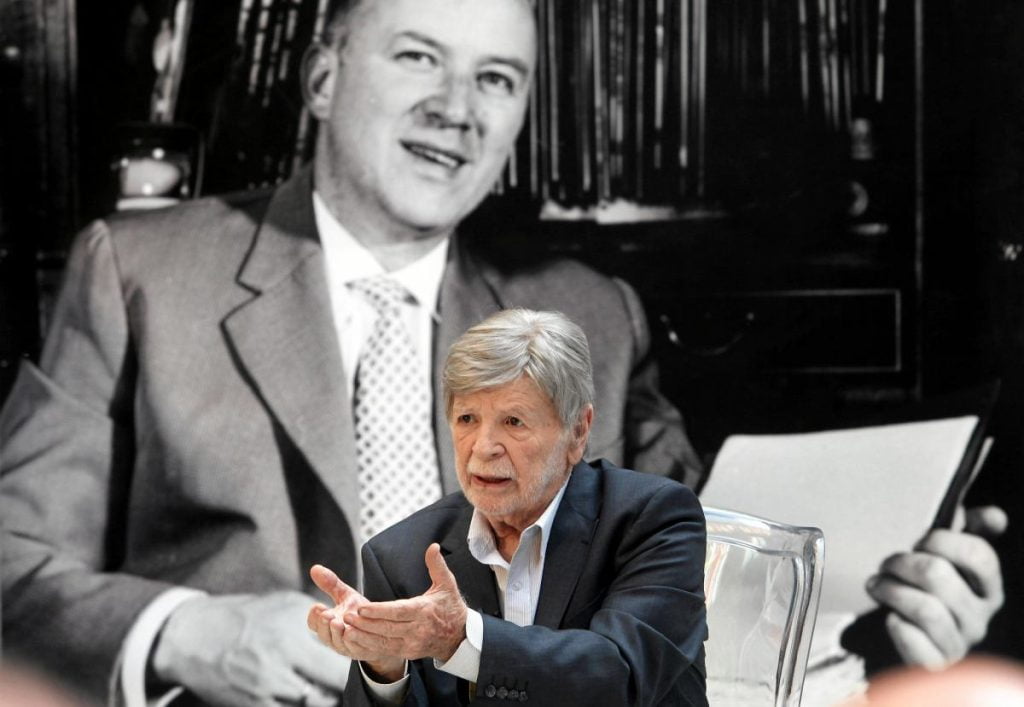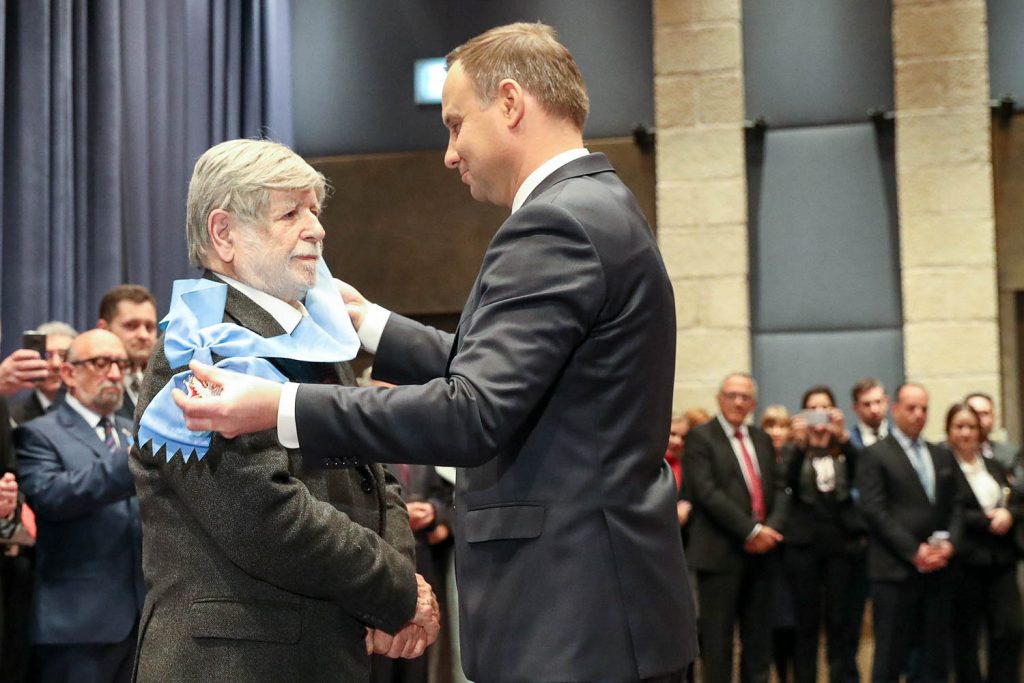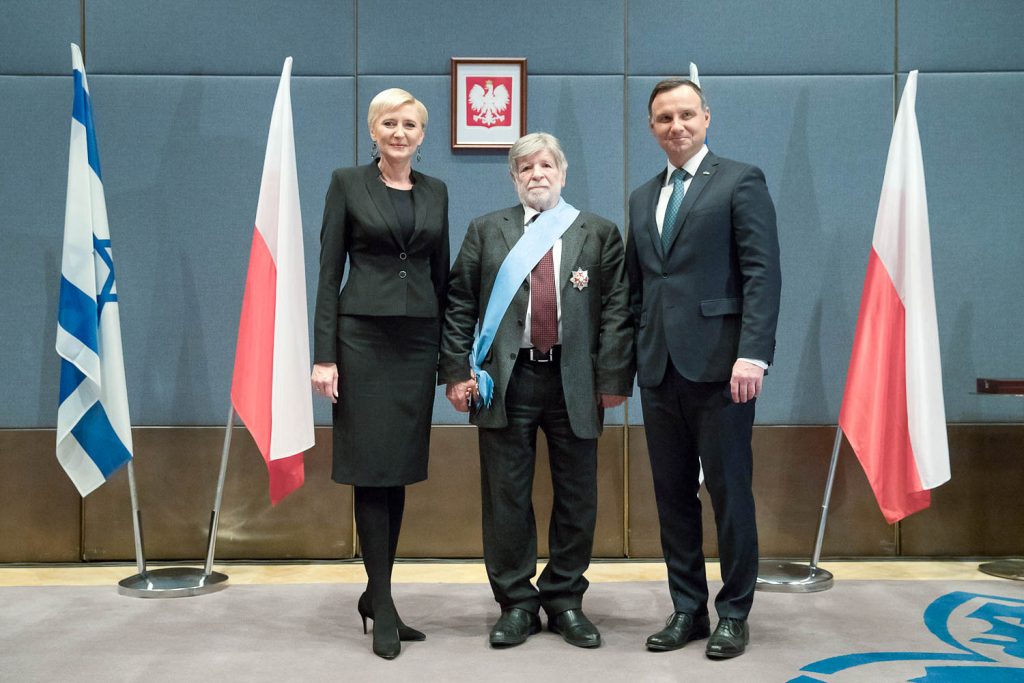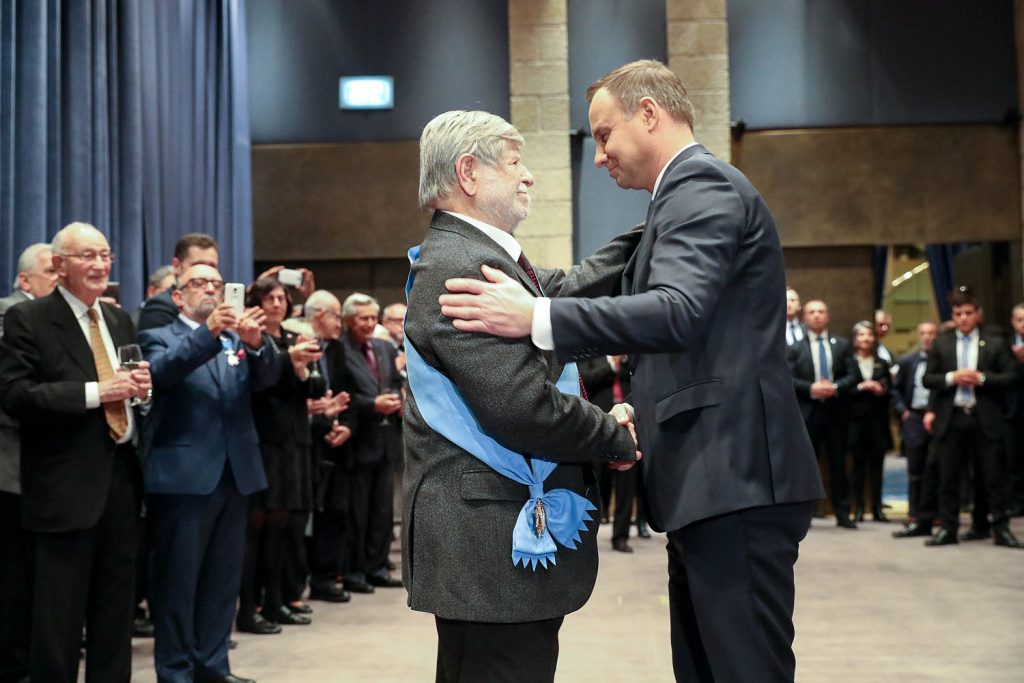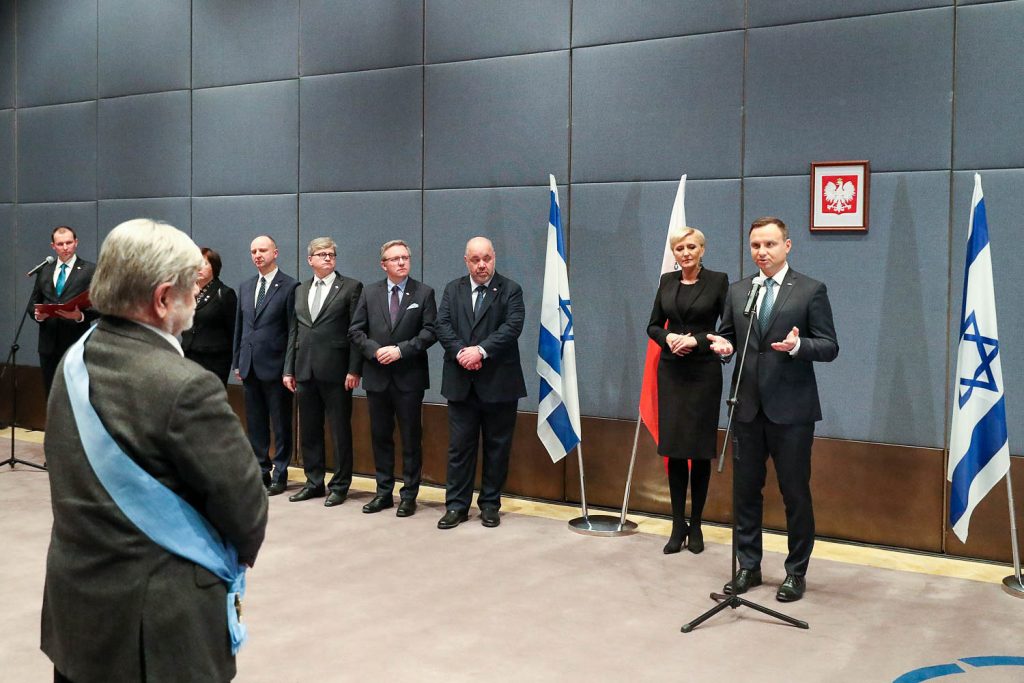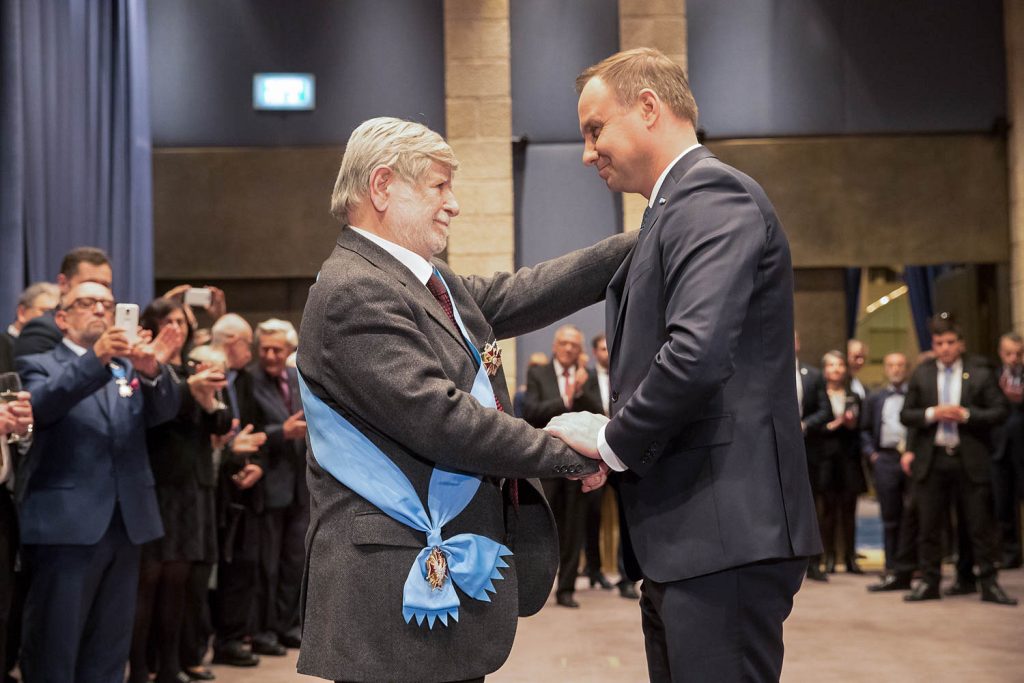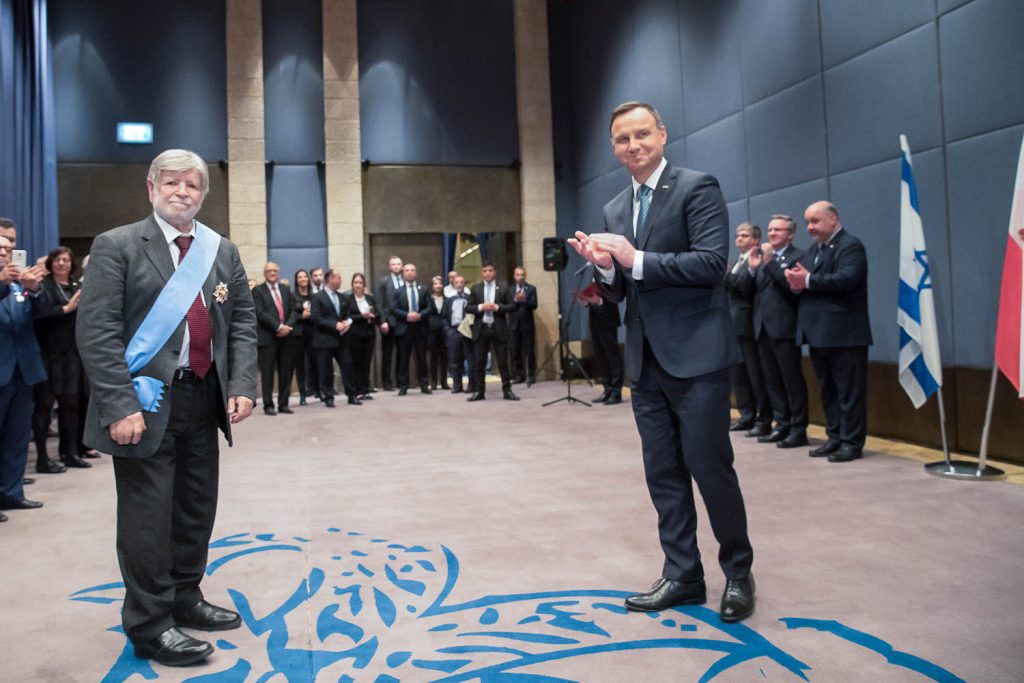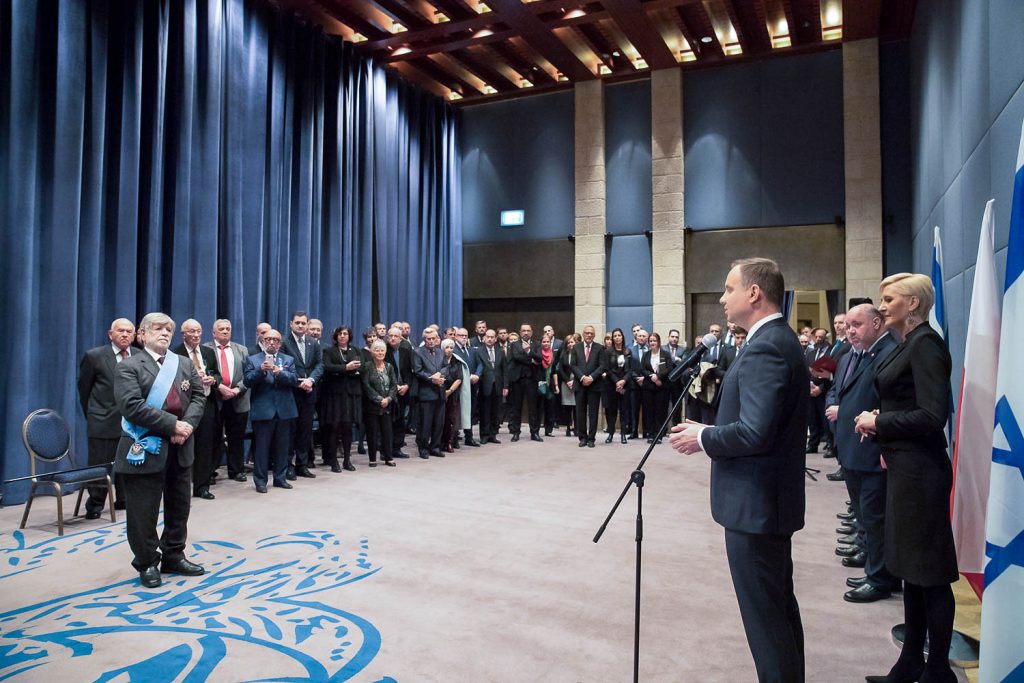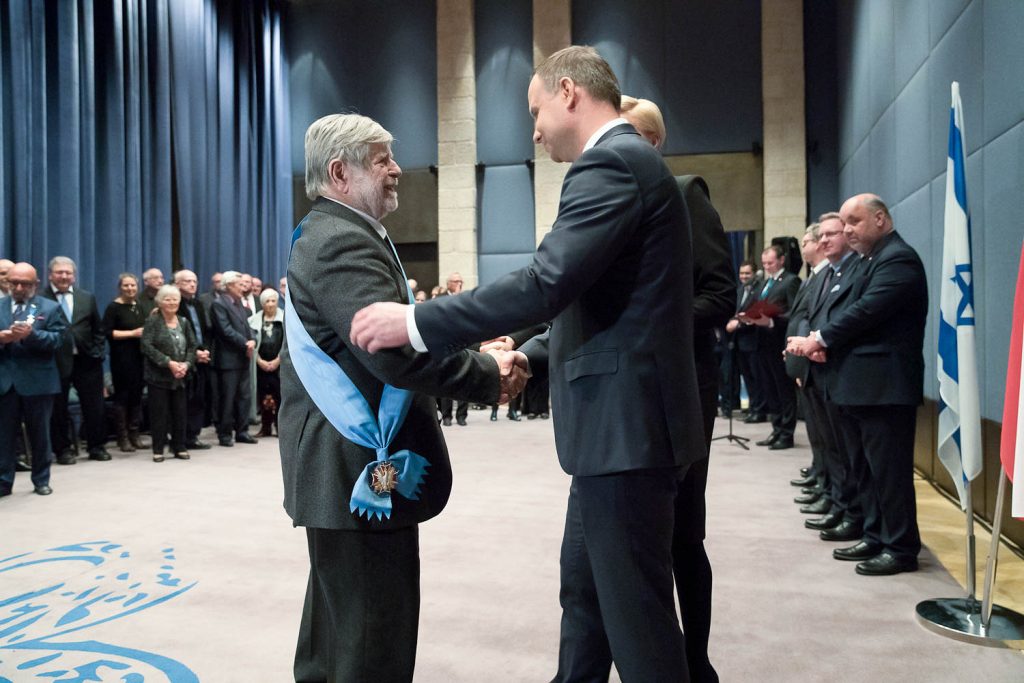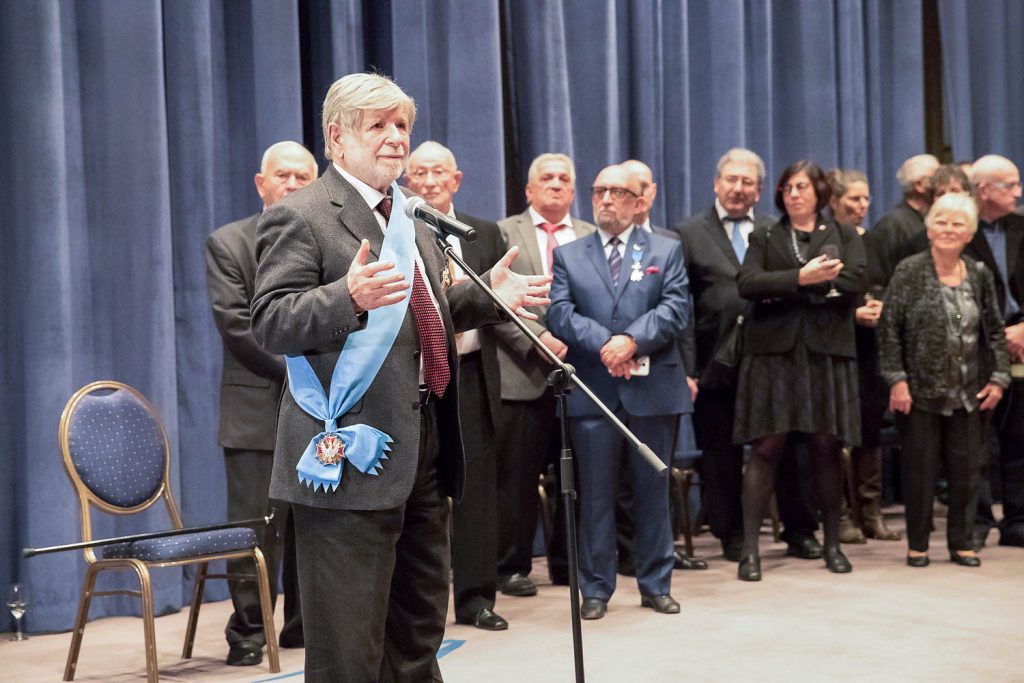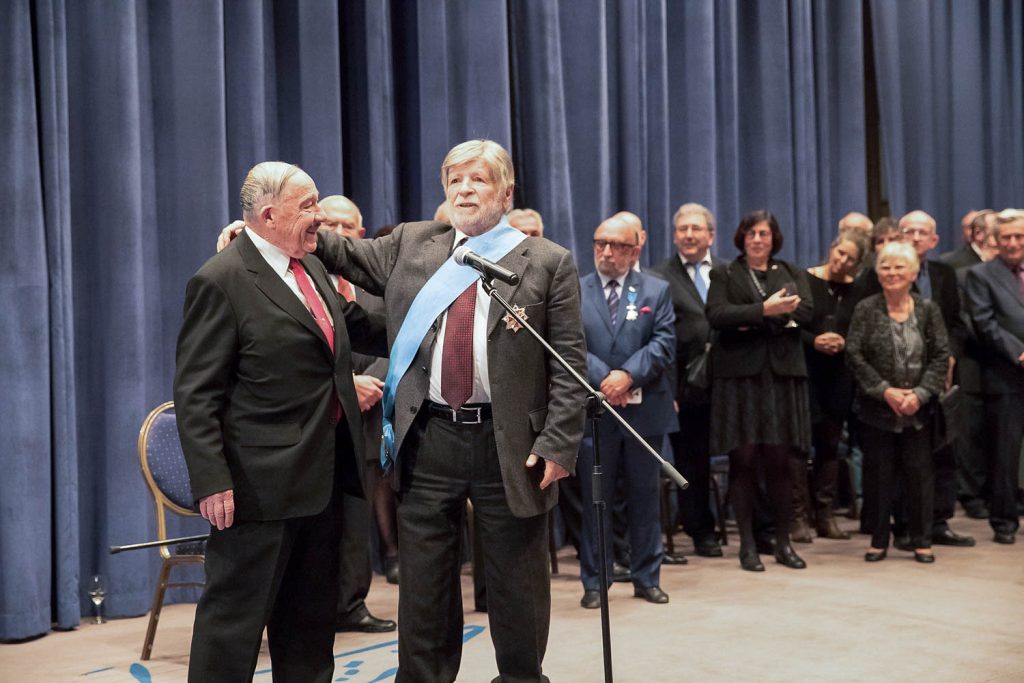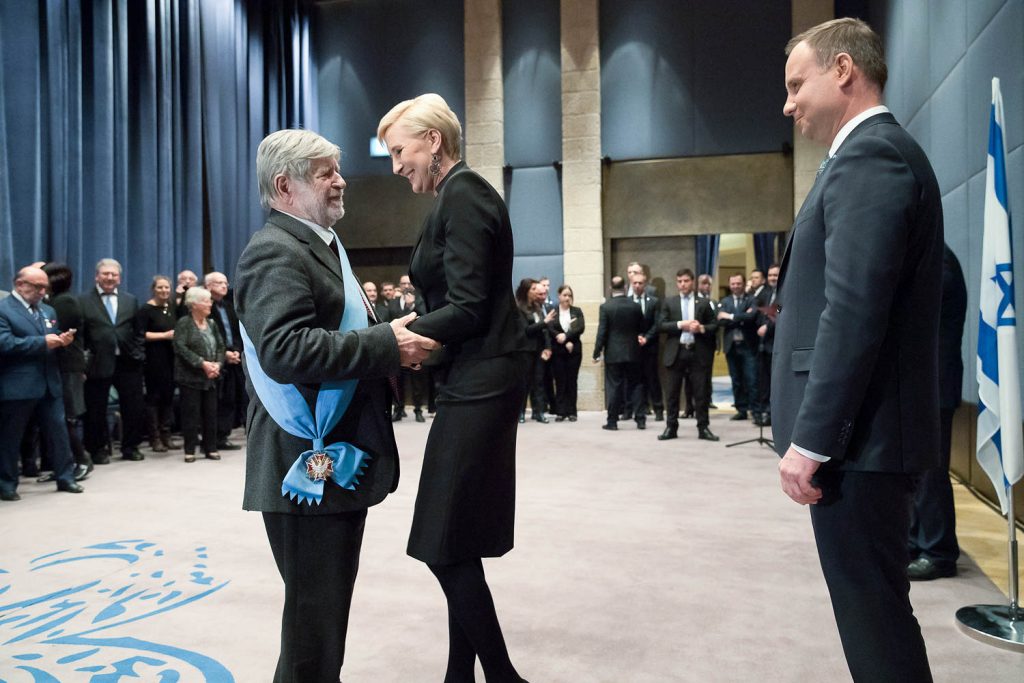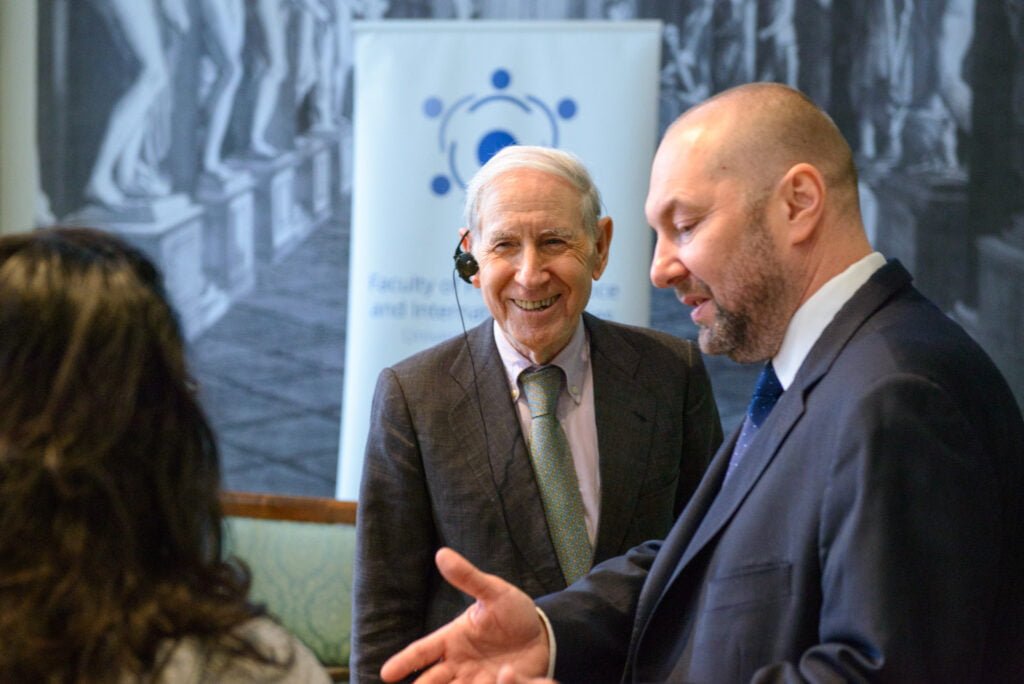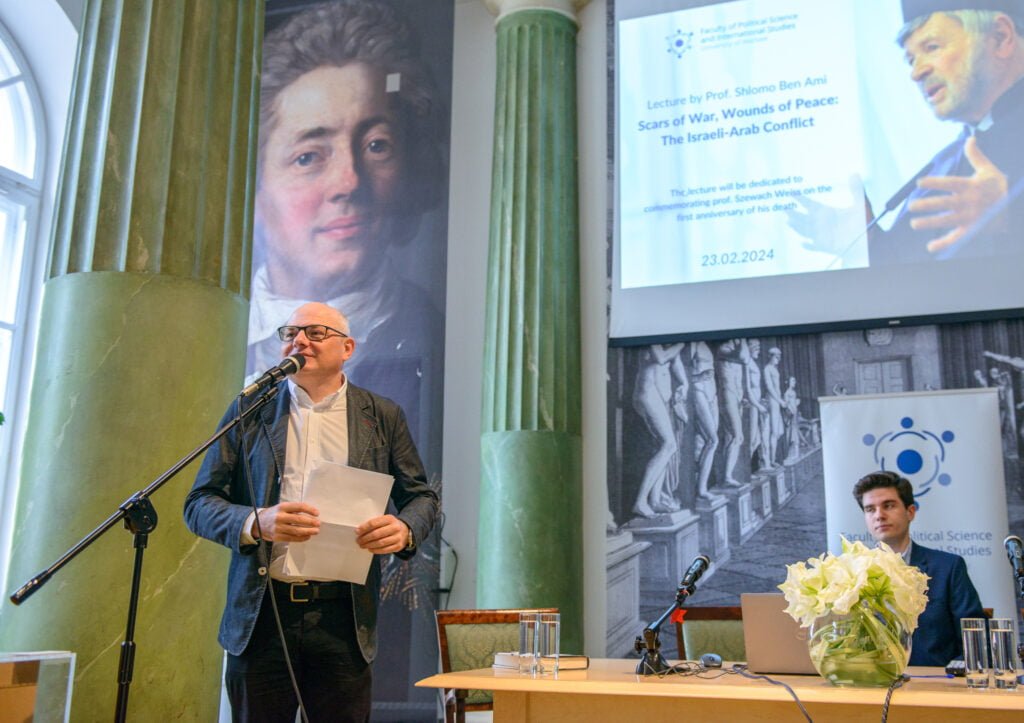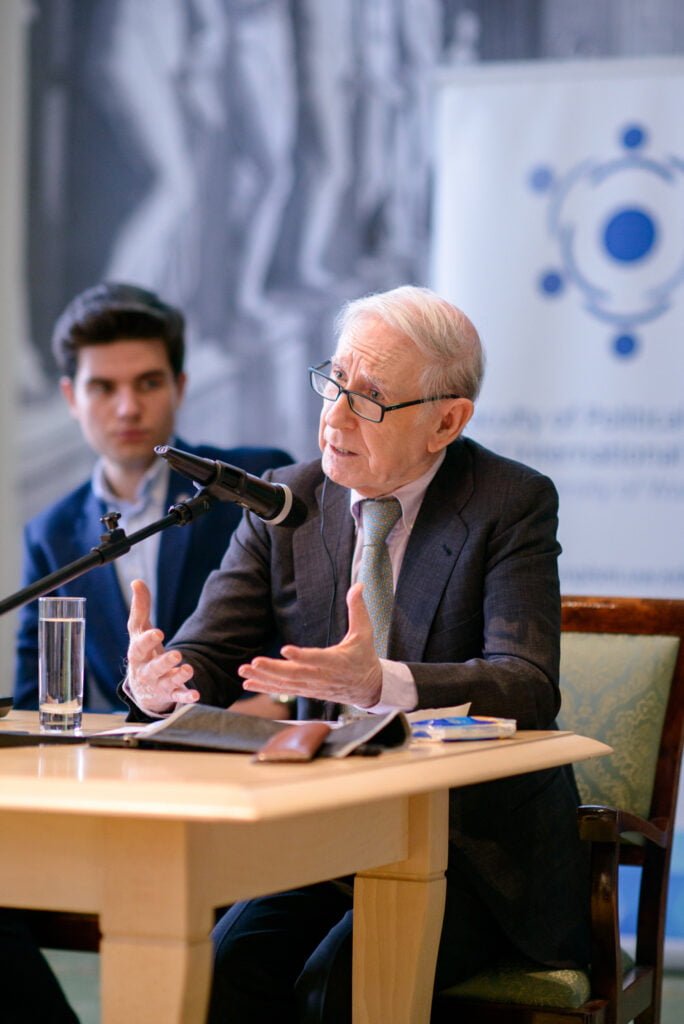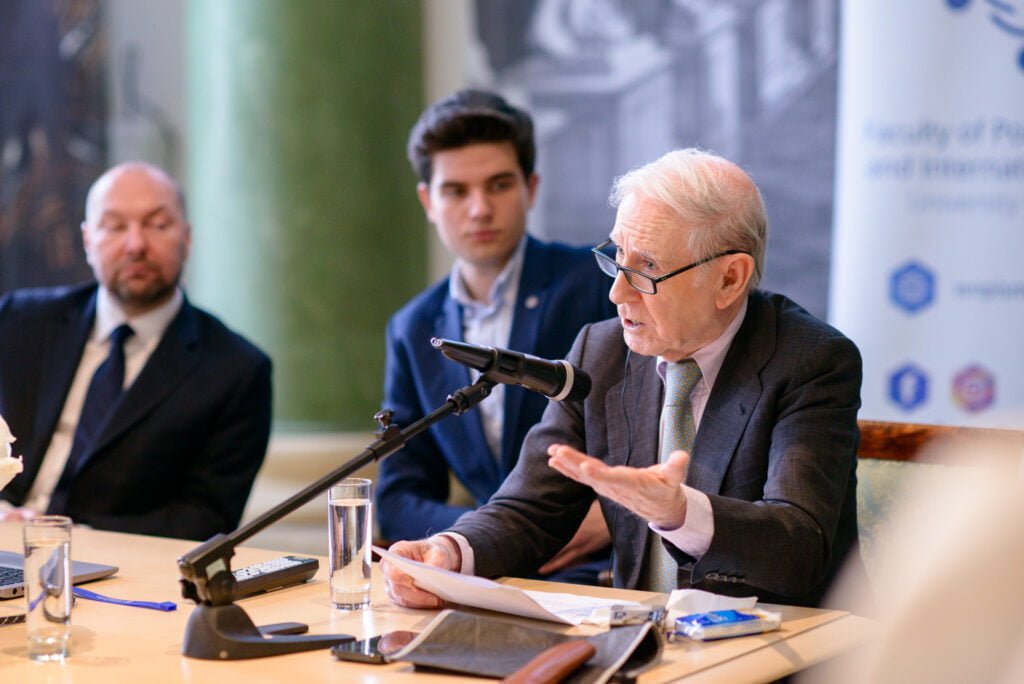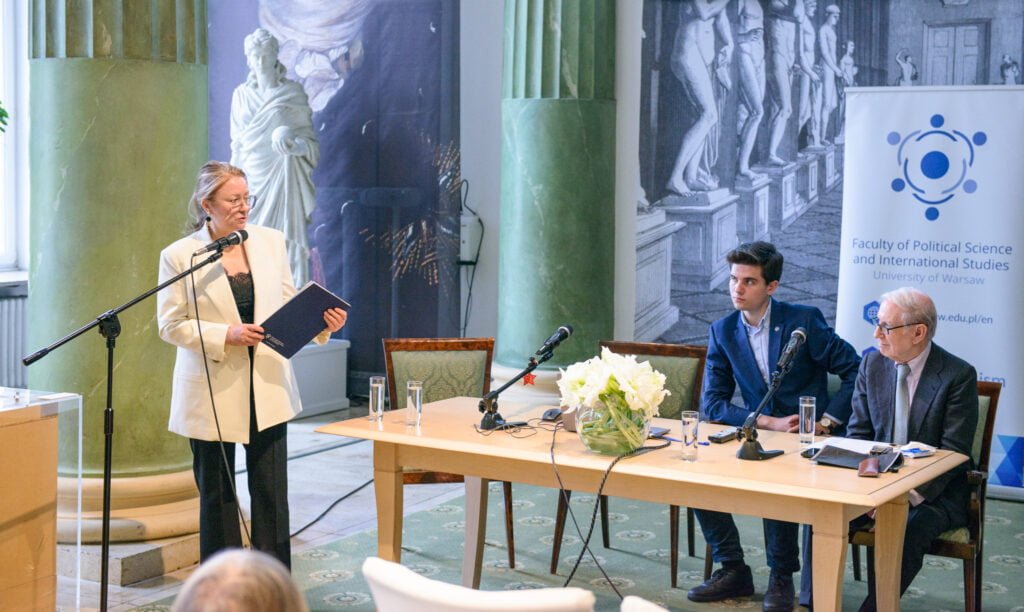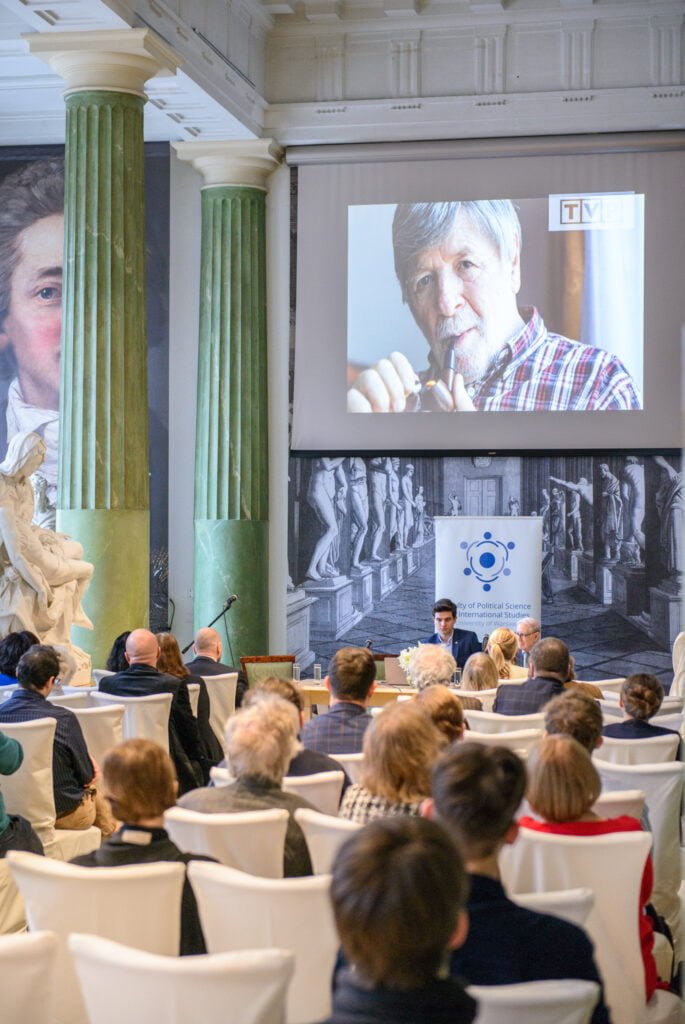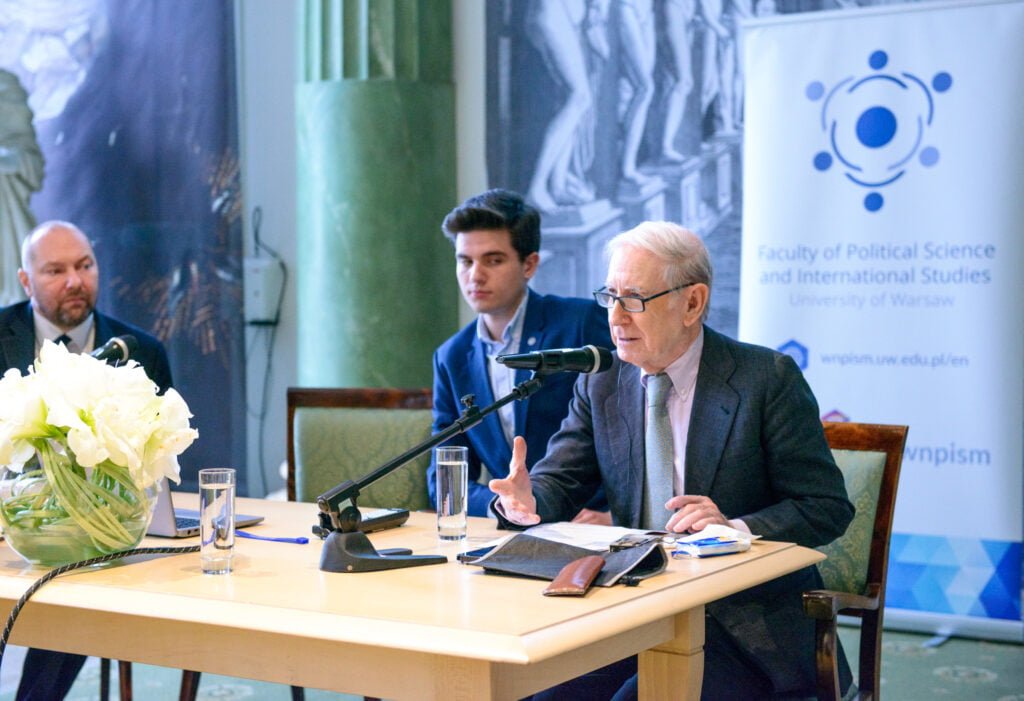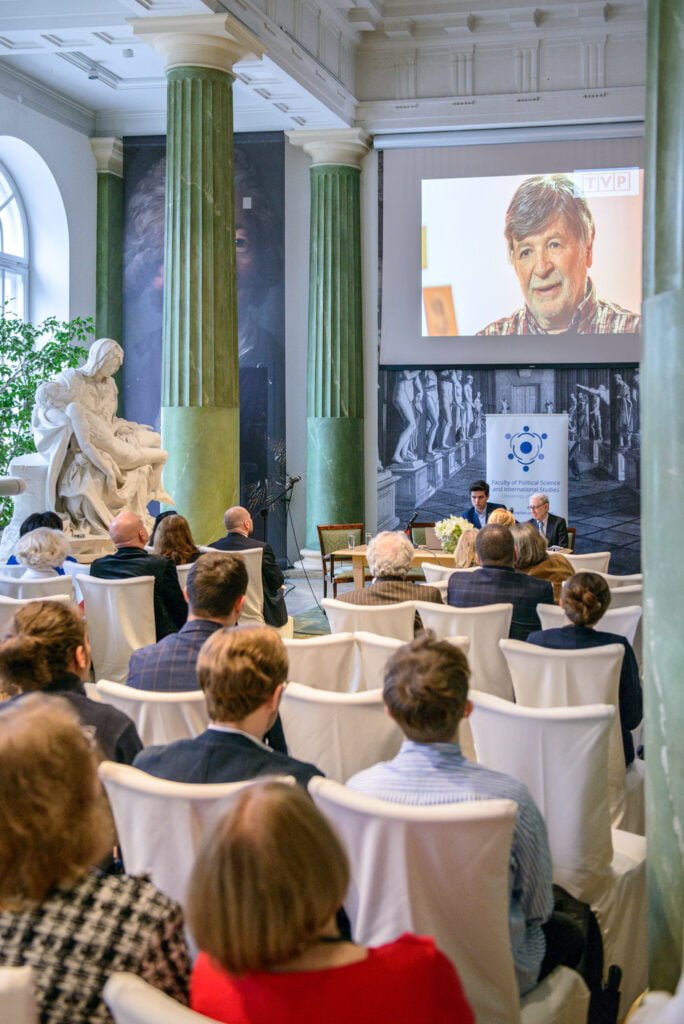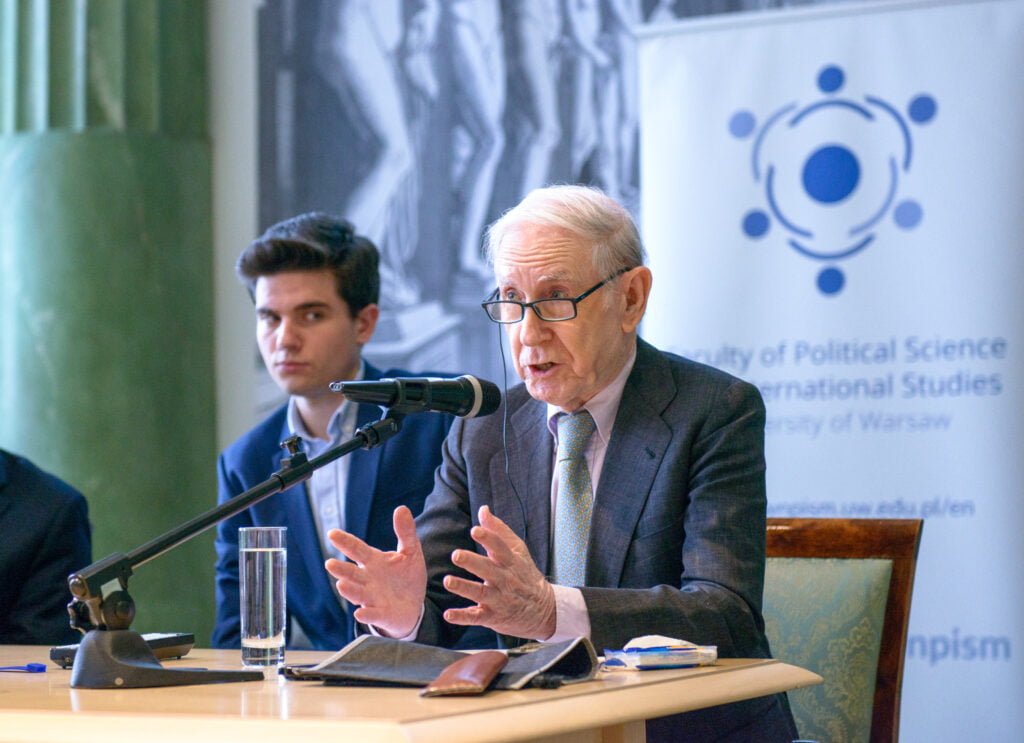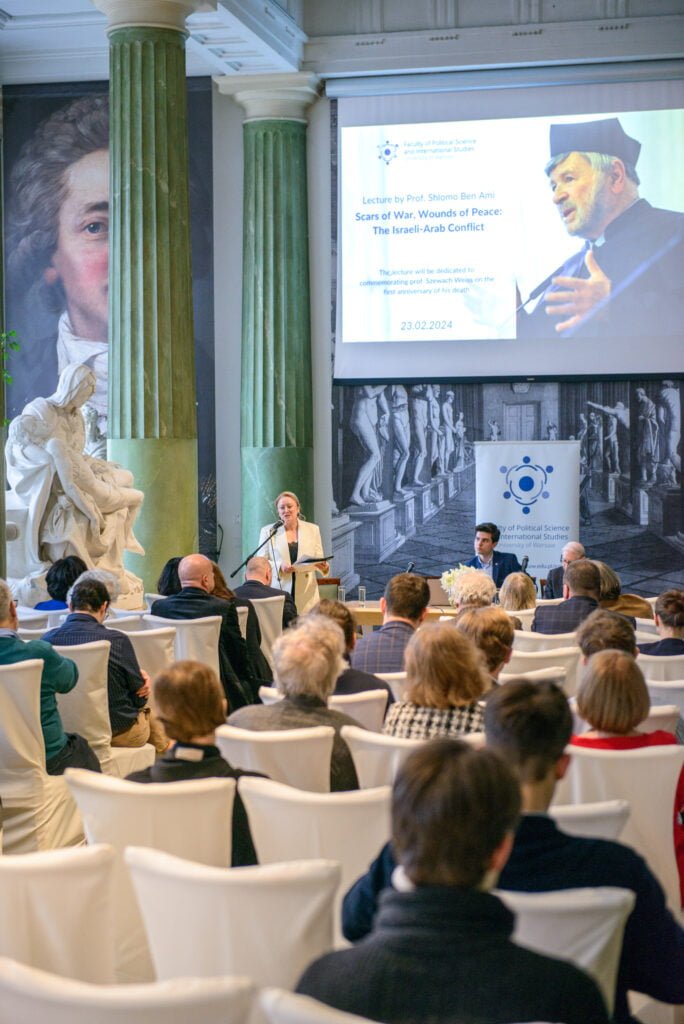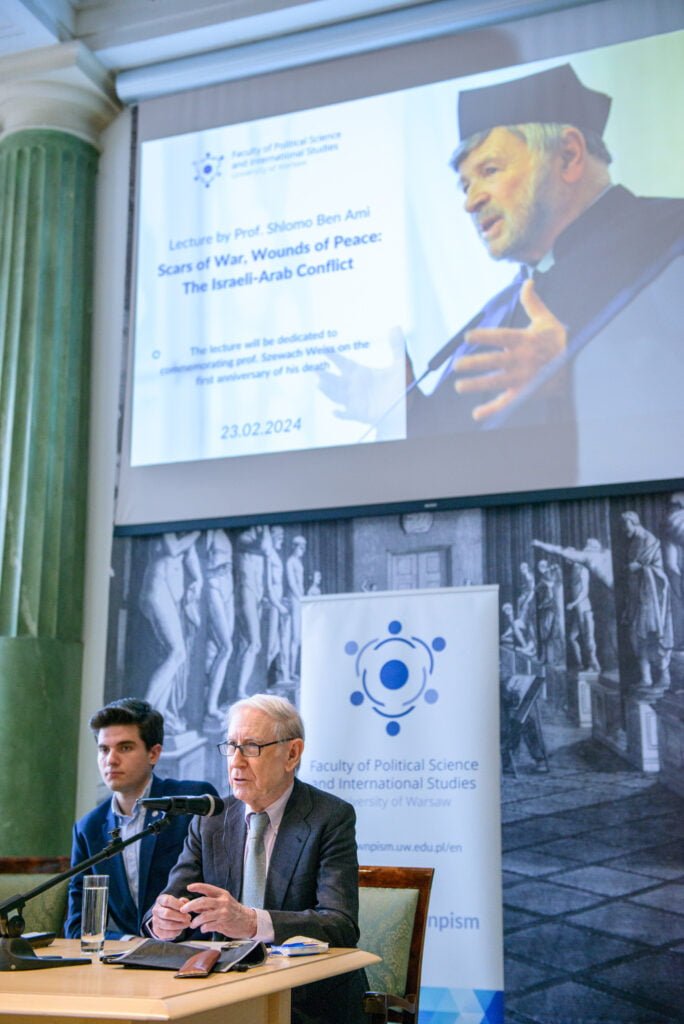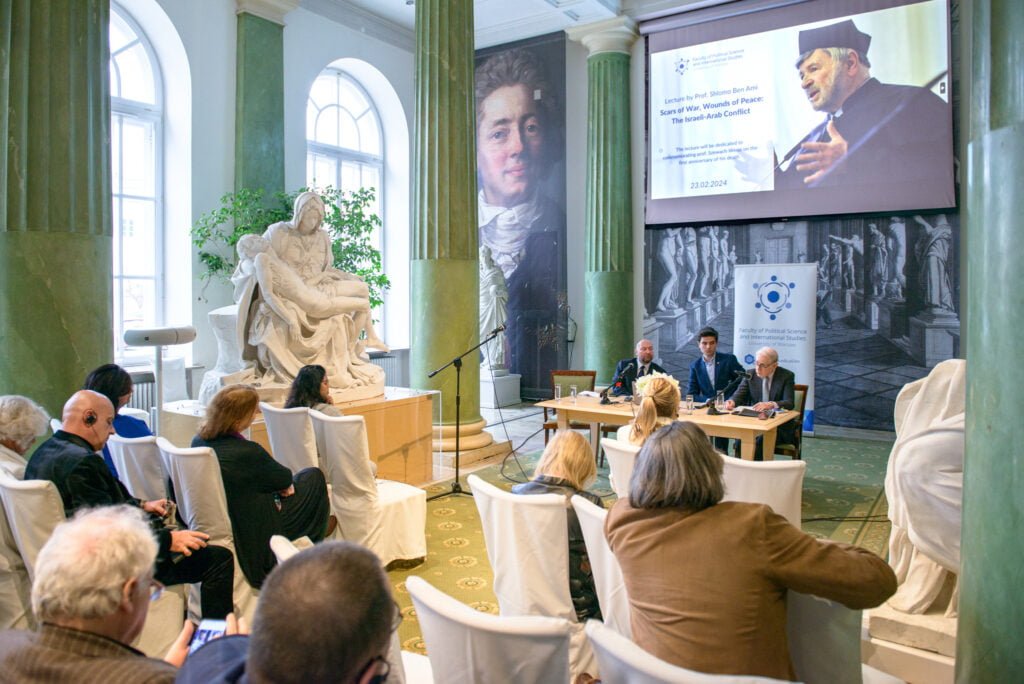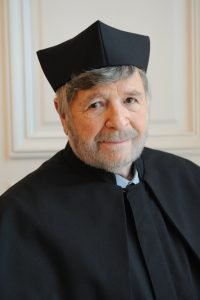
A prominent Israeli politician: a local government official, a member and then Speaker of the Knesset, Israeli ambassador to Poland in 2001–2003. Professor and founder of the department of communications at Haifa University. For more than twenty years he was a lecturer at the University of Warsaw – at the Department of Political Science and Center for Research on Israel and the Jewish Diaspora. He received an honorary doctorate from the University of Warsaw in 2011.
Shevah Weiss’s lectures on the history of the Jewish people and the Israeli state were very popular with students at the University of Warsaw (as they had previously been in Haifa), and also attracted many listeners from outside the university. Shevah Weiss authored many scholarly works on governmental systems, social and local government policy, labor rights, issues of equality and equal rights, Jewish identity, and ethnic problems.
From the beginning of his political activity, he belonged to the Labor Party. He worked closely with Israeli Prime Minister Yitzhak Rabin, winner of the Nobel Peace Prize, and shared Rabin’s views on Israeli-Palestinian relations. He saw the solution to the Israeli-Palestinian conflict as the creation of two states: one Jewish, one Palestinian.
He was president of Yad Vashem (the World Holocaust Remembrance Center) from 2000 to 2006. The politics of remembrance occupied a central place in his public activities. Professor Shevah Weiss was academically and politically involved in Polish–Israeli–Jewish dialogue. In 2017, President Andrzej Duda awarded him the highest Polish decoration, the Order of the White Eagle, conveyed to the most praiseworthy Poles and outstanding citizens of foreign countries.
Shevah Weiss’s public activities were very well received and appreciated, in both Israel and Poland. In recognition of the quality of his governance and integrity in public service, he received the Amitai Award for Integrity in Public Service (1996) and the Award of the Movement for Good Governance (1999). Shevah Weiss closely identified with all activities aimed at promoting respect for human rights and equality, and received an award from the Council for a Beautiful Israel (1995) as well as the “Distinguished for Tolerance” medal (2003) for his unflagging support of these values. He was also honored with the Jan Nowak-Jeziorański Award (2018) for “thinking about the state as a common good,” the Missio Reconciliationis distinction (2003), bestowed on Polish and foreign citizens who have distinguished themselves in the work of reconciling nations, and the Grand Cross of the Order of Merit of the Republic of Poland (2004). In 2008 he received the Sérgio Vieira de Mello Award (special prize) for his work towards ensuring the peaceful coexistence and cooperation of societies, religions, and cultures, and in 2009 he received the Bene Merito Badge of Honor, a distinction bestowed on Polish citizens and foreign nationals for activities that strengthen Poland’s position in the international arena.
Szewach Weiss held honorary doctorates from the University of Wrocław, the Medical University of Łódź, Maria Grzegorzewska University in Warsaw, the University of Economics in Katowice, SWPS University of Social Sciences and Humanities, in addition to the aforementioned University of Warsaw.
He died on February 3, 2023, in Ramat Gan, and was buried in Mount Herzl cemetery in Jerusalem. His final resting place is in a section surrounded by many of Israel’s most important leaders and persons of special merit.
Recollections of Shevah Weiss
Articles collected in Kwartalnik Historii Żydów 2023, issue no. 2 (in Polish)
Articles collected in Gal-Ed: On the History and Culture of Polish Jewry, 2023, no. 28 (in English).
Hebrew version:שבח וייס
Daniel Cichorski, “Wspomnienia studenta” [Recollections of a Student], Pismo uczelni “UW”, 2023, no. 2.
W drodze [On the Road] – recollections listened to, transcribed and edited by Elżbieta Kossewska
Program of the honorary doctorate award ceremony at the University of Warsaw
Excerpt from a speech delivered by Prof. Shlomo Ben AmiSelected publications and documents
Ziemia i chmury [Land and Clouds] – Shevah Weiss interviewed by Joanna Szwedowska, Wydawnictwo Pogranicze, Sejny 2002.
Pamiętam… [I remember…] – Shevah Weiss interviewed by Kamila Drecka, Wydawnictwo Literackie, Kraków 2018.
Z jednej strony, z drugiej strony [On the One Hand, On the Other Hand] (2005), Szewach Weiss, Elżbieta Cherezińska, Prószyński i S-ka, Warsaw 2005.
…tak blisko …tak daleko [So far away… so close…] documentary film directed by Maciej Dutkiewicz, 2019.
Grants
Correspondence and Journalism of David Lazer of Palestine/Israel (1941-1974)
David Lazer was one of Israels leading journalists (born 1902 in Kraków, died., 1974 in Tel Aviv)). In 1960 he was awarded the highest honour in Israel – the Sokolow Prize. What is more, his correspondence included some of the greatest figures of Polish and worlds literature (Alexander Wat, Stanislaw Vincenz and his wife Irene, Wladyslaw Broniewski, Shmuel Agnon). David Lazer is widely known figure in Israel. In contrast, not much attention has been paid to him in Polish literature, although he was very well recognised in the circles connected with “Kultura” and London’s “Wiadomosci” which awarded him for his prose in 1973. “Correspondence and Journalism of David Lazer of Palestine / Israel, (1941-1974) consists of two parts. The first, preceding the publication of his documents, is indeed going to be a biography of David Lazer, in which I am going to present his roots, family home, his work in Poland, political activities, his academic and journalistic career, his journey to Palestine through Soviet Union and his life and work in Palestine and Israel. The next part of the project is going to be a published correspondence of David Lazer with various cultural circles around the world, including prominent Polish emigrants in Paris and London, as well as leaders of the Jewish community. In parallel to this research, I am going to carry an analysis of articles published by David Lazer in the Polish-language press in Palestine during World War II, and in the Hebrew and Polish- language press in Israel.This analysis will provide a parallel narrative to the letters written by Lazer. Given a very limited knowledge of his life and work, the work plan presented above seems to be justified.Thus, the final work will present both intellectual and journalistic activities of Lazer and his friends, but also, and above all, the course of debates conducted by the intellectuals of the twentieth century. Lazers correspondence and his journalistic pieces show the thoughts of known and respected writers on the events that affected all generations who personally experienced the horrors of the Second World War. His correspondence introduces a discourse on ideology that seduced the great minds of the twentieth century (including communism). What makes the letters even more valuable is
the fact that they shed light on a private and public lives of the authors, introducing the reader to their very personal literary lives. The time range the project is focused on covers the years 1941-1974, the first turning point marking Lazer's arrival to Palestine and the latter – his death.Polish expatriates in Palestine (1939-1948)
Wychodźstwo polskie w Palestynie (1939-1948) 2016/23/B/HS3/03015
Kierownik projektu: Elżbieta Kossewska1. Aim of research/ Research thesis
The aim of the project of to present Polish expatriates in Palestine in the years 1939-1948 against local and global political events and global migration movements during the World War 2 and after. During the war Palestine was one of the largest and most important centers
for Polish military and civilian expatriates in the Middle East. In Palestine Polish refugees and Jews who had emigrated from Poland before the war created a unique community. The worlds of incumbent and new inhabitants of Palestine, especially those from Poland and of
Polish-Jewish roots, mutually penetrated in the cultural, social and political sphere, creating a common history but with many variations determined by individual choices and fates. The problem of the state was ever-present in the lives of Polish expatriates; therefore, my project
will try to find answers to the following question: What is the impact of the state (or lack of it) on the formation of identity of refugees and the fate of ethnic communities and their values?2. Methodology
In my study, I will apply the historical method and an inquisitive type of narrative that investigates the motives of human actions, surpassing the results and entering into the sphere of anthropology. This shift from history to anthropology will provide an opportunity to expand the areas explored by historians and to show the functioning of groups and individuals by directing attention to their emotions and experiences (fears, hopes and motivations). Combining the historical and anthropological methods is essential to show refugees’ customs and expectations, which largely determined their functioning in a multiethnic environment. I will also use historical statistics, extracting, standardizing and categorizing data. I will analyze the research material and build cause-effect chains, which in turn will lead me to formulating a thesis. Through combining research materials with theory I will be able to explore the subject to the maximum. On the one hand, I will provide information and facts, on the other, I will construct mechanisms which determine human actions, at the same time presenting the laws and mechanisms governing societies and individuals.3. The influence of expected results on the development of science, society and civilization
The project fills a gap in research on one of the important centers of Polish expatriation during and after the World War 2. It also initiates important discussion on social issues of building a community and the state. A place such as Palestine imposes a strong element of
religious affairs and offers an interesting panorama of ethnicities and religions (Christianity, Judaism and Islam). The approach to the subject as presented in my project will help raise important questions of identity, transformation and tensions caused by national issues.
These questions are also relevant to the development of modern societies. The project is particularly valuable due to its interdisciplinary character, as its results can be used in various fields of humanities, especially since the issue of refugees is an important social
topic in the current national and international politics.Recent Publications
E. Kossewska, Polish Jews in Israel: Polish-Language Press, Culture, and Politics, Boston (Wydawnictwo Brill), 2021, pp.444.
E. Kossewska, Marc Chagall – Dawid Lazer. Listy, Warszawa 2018.
Brzemię pamięci, pod red. E. Kossewskiej, Wydawnictwo Neriton, Warszawa, 2009.
E. Kossewska, Hebrajski przekład Mitologii. Listy Jana Parandowskiego, Dawida Lazera i Dawida Ben Guriona, „Pamiętnik Literacki” 2018, z. 2, s. 183–207
E. Kossewska, „I work for people who love…” David Lazar, Marc Chagall and the Jewish State, „The Jewish Quarterly Review”, 2021, vol. 111, no 1, pp. 1-9
E. Kossewska, The Hebrew Translation of Mitologia (Mythology): The Correspondence of Jan Parandowski, David Lazer and David Ben Gurion, „Gal-ED”, No. 26-27 (2021), pp. 161 -184.
E. Kossewska, Literature and Memory: The Correspondence between Marc Chagall and David Lazer, “The Polish Review” , vol 65, No 4 ( 2020), pp.23-35.
E. Kossewska, Władysław Broniewski w Palestynie, “Archiwum Emigracji” , 2018/2019, z. 1-2, s. 259-281.
E. Kossewska, Between Communism, Zionism, and Statehood: Władysław Broniewski in Palestine, “The Polish Review”, Vol. 66, No. 4, 2021, s. 78 -105.
E. Kossewska, Homeland, State, and Language. The integration of Polish Jews into Israel, “Polin. Studies in Polish Jewry”, 2023, vol 35, s. 323 -336.
E. Kossewska, Betwixt Jerusalem and New York: Jakub Apenszlak’s Attempt at Fostering Polish-Jewish Rapprochement in the Midst of World War II, Ohio University Press, 2023.
Gallery of photos from the Shevah Weiss Center for Research on Israel and the Jewish Diaspora
Gallery of photos from the honorary doctorate award ceremony at the University of Warsaw
Gallery of photos from the Jan Nowak Jeziorański Award ceremony
Gallery of photos from the Jan Nowak Jeziorański Award ceremony
President RP decorates Shevach Weiss the Order of the White Eagle
Photo gallery of the ceremony commemorating the first anniversary of the death of Prof. Shevah Weiss - lecture by Prof. Shlomo Ben Ami
The Shevah Weiss Center for Research on Israel and the Jewish Diaspora
Menu
About us
The Center for Research on Israel and the Jewish Diaspora was established in 2008 by Prof. Shevah Weiss, Prof. Stanisław Sulowski and Dr. Elżbieta Kossewska. The work of the Center was headed by Prof. Shevah Weiss from 2008 to 2021, since then it has been led by Dr. Elżbieta Kossewska. The Center for Research on Israel and the Jewish Diaspora engages in research, publishing, teaching and training activities. We organize conferences, seminars, classes, and prepare research publications. The intention of the founders of the Center was to create a forum for debate on the significance of Israel and the Jewish Diaspora in the modern world, on Israel’s foreign and domestic policy, and on Polish-Jewish relations. In May 2023, by the decision of the Rector of the University of Warsaw and the authorities of the Faculty of Political Science and International Studies (WNPiSM), the Center was named after Prof. Szewach Weiss




